SEE CHANGE IN AURORA?



Voters elect a majority of progressive city lawmakers to the Aurora City Council dais, a stark contrast to the last four years of conservative rule


















































































Voters elect a majority of progressive city lawmakers to the Aurora City Council dais, a stark contrast to the last four years of conservative rule














































































After four years, voters got real last week with Aurora’s chaotic and gruesome city council political reality show.
Exhausted by the destructive antics and partisan politics of a handful of city lawmakers, voters on Election Day gave the boot to firstterm council members Danielle Jurinsky and Steve Sundberg.
In more than 30 years of covering Aurora politics, and almost 40 years as a journalist, I’ve seen some stuff. But I’ve never seen anything as dangerously weird as what Jurinsky and Sundberg inflicted on the state’s third-largest city.
Not that there’s ever been a shortage of bizarrebordering-on-no-way in local politics.
Years ago, former Arvada Councilmember Joanne Conte angrily told me she was “disappointed” that I was “not a virgin” when she asked me who a woman was that she saw me with at a local restaurant.
I have piles of reporter notebooks with circles around bizarre and ghastly things that all kinds of elected officials have said or done over the decades.
But I have never seen an elected official inflict the kind of damage on their constituents, their community and their own political careers as have Jurinsky and Sundberg.
Just as bizarre, I have never seen a local body of government where partisan allies either ignored, dismissed or even defended atrocities by their elected colleagues, even when they were victims of their abhorrent stunts.
Jurinsky’s A-Town demolition derby started almost as soon as she got elected when she began to first quietly and then publicly — on a right-wing talk-radio show — talk trash about former Aurora Police Chief Vanessa Wilson.
She literally called Wilson “trash.”
Aurora is currently under a consent decree to turn around its police force after an extensive state investigation found long and extensive “patterns and practices” of police using excessive force, especially against people of color.

DAVE PERRY Editor
The consent decree isn’t about a couple of “oopsies.” This isn’t even about the time that officers involved in the death of Elijah McClain took selfies making fun of how cops fatally choked the innocent and unarmed Black man in 2019. The decree isn’t about the time Aurora cops mistakenly pulled over a car with Black girls and women inside and forced them to lie face down on hot asphalt as they cuffed them. It’s not about the time an Aurora cop was videotaped pistol-whipping an unarmed Black man bloody. He was accused of trespassing while sitting on a parking lot median.
Aurora is a community where people of color, many still talking in accents they brought with them from nations all around the globe, make up the majority of city residents.
So it was not just cruel, but obscene when Sundberg made Facebook videos in 2020 during the pandemic as “advertisements” to draw customers to his Aurora pub. In one video, he wore a Mexican blanket and spoke in pidgin English with a Mexican accent, making racist tropes during what he insisted was just a joke. He made similar videos depicting an Arabic man in a makeshift turban on a carpet, and one where he and another employee pretended to horrify a Muslim by offering him pork, and another at a urinal linked to the size of Black male genitalia.
He never apologized for making the videos nor conceded that they were racist. Instead, he apologized to anyone who felt they were offended by them. While outraged immigrant and minority community leaders demanded his resignation, his fellow Republican city lawmakers demurred and some even defended him.
That’s not the kind of community leaders Aurora needs nor deserves, and voters last week clearly agreed.
Jurinsky had taken the political club to Aurora’s diverse constituency even further.
She became a darling on the national right-wing
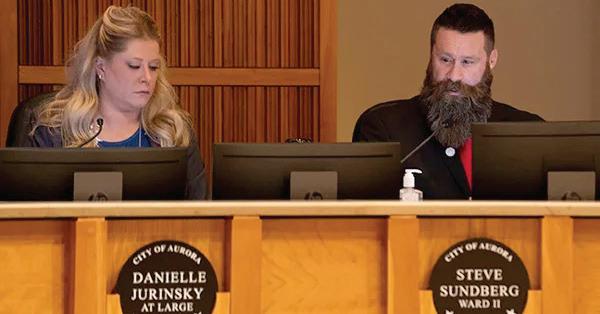
media circuit last year after throwing a tantrum about Venezuelan immigrants. She lit up first on social media and then national TV when thousands of people surprised everyone by showing up on a Sunday afternoon last year in July to an Aurora shopping center parking lot to celebrate what at the time appeared to be the election loss of Venezuelan dictator Nicolas Maduro. Police later credited the rowdy flash-mob to a social media circuit that spun out of control.
While police said the one-off event was weird and annoying, it was not the critical threat Jurinsky tried to make it out to be on social media.
“The police were totally over run (sic), and we’re (sic) forced to get out of the area for their safety,” Jursinky said in a Facebook post last summer. The post has since been deleted.
“A police car was shot up. This is in the United States of America… this is in YOUR city. Please, please spread the word. This November’s election may, in fact, be the actual most important of your lives, your children’s lives, and your grandchildrens (sic) lives.”
Police said it wasn’t true.
They insisted they were in control of the situation the entire time. The cop car “shot up” actually occurred hours later down the street from the shopping center.
This led to regular appearances on right-wing Fox News shows where Jurinsky repeatedly tried to make the case that Aurora neighborhoods and apartments were overrun with Venezuelan gangsters.
That led to Donald Trump repeatedly insisting that Aurora had been overtaken and destroyed by vicious Venezuelan gangs.
In fact, it turned out that some gang members and some Venezuelans linked to the notorious prison gang Tren de Aragua were living in three Aurora apartments that landlords had run into the ground.
Aurora Mayor Mike Coffman on Next On 9News with Kyle Clark called them “slumlords.”
But credible Aurora police officials at the time made clear that hysterical claims by Jurinsky, Sundberg and Councilmember Stephanie Hancock were baseless exaggerations.
Still, Jurinsky persisted. She joined up with the Trump re-election campaign and even appeared on-stage when Trump came to Aurora last October to insist that the city, and even Colorado, was overrun with Venezuelan gangsters. That’s when Trump promised mass deportations would be called “Operation Aurora.”
It will take years to undo the damage Jurinsky and others on city council have done to the Aurora community, and especially its businesses. She and others on the city council were complicit in her partisan ruse. They scared the living hell out of people, not only who live here, but who have since said they would never venture east of Yosemite Street for fear of being murdered by TdA gangsters.
As inside and outside pressure built against Jurin-
sky for her savage hyperbolic dramatics, the city’s gloomy economic picture muscled onto the city council dais last year.
Aurora retail sales are down and sinking.
Jurinsky’s pet project to end the city’s $2 per-employee-per-month “head tax” on businesses, was in jeopardy. That’s because the city’s budget was bleeding dollars badly and Aurora needs the $6 million this relatively benign tax brings in.
When other conservative council members worked last fall toward a way to postpone ending the tax, Jurinsky had a political tantrum like no other on record in Aurora.
She was angry about a proposal by Republican Councilmember Francoise Bergan, offering to continue levying Aurora’s employee tax.
“…every single one of you can go fu** yourselves!” Jurinsky said in a group text to some council members. The series of texts was obtained by the Sentinel.
“I fu***** campaigned on that you fu***** pieces of shit!”…“And I hear you’re a co sponsor, Francoise. You can definitely go fu** yourself! You’ve never owned a business or a fu***** thing in your life you pretentious bitch!”…“My friendship will literally (sic) every single one of you is dead! DEAD! oh, and my loyalty… also dead! I hope you all have miserable fu***** lives! I might make that happen for a few of you. FU** YOU!”
Yeah, that really happened.
City council members on both sides of the political aisle, city staffers and others have repeatedly called Jurinsky’s behavior “toxic,” “abusive” and “bullying.”
During the last three decades, I’ve seen Aurora’s political cast play just about every part you could write into what had now become a cringy melodrama. The council dais, however, has primarily always been filled with passionate, determined and heartfelt conservatives, liberals and everything in between.
There’s been no shortage of passionate positions on a wide-range of high-voltage issues.
But previous councils have refrained from calling stubborn, disruptive protesters “terrorists” like Hancock did last year. They didn’t tell offensive sexualized tales about jock straps worn as face masks like Sundberg told captive city employees almost four years ago. And they didn’t accost lawmakers and even the public with the venomous ad hominem that Jurinsky turned to at almost every council meeting.
Whether voters dismissed Jurinsky and Sundberg because of their behavior or their political philosophies, in a city that simply doesn’t think or behave like them, they’re gone. The Aurora City Council has a chance now to evolve and ensure that no matter how difficult city politics become, it’s never permitted to devolve into an organization that becomes a bigger threat to the community than the challenges they’re elected to solve.
Follow@EditorDavePerryonBlueSky,Threads, Mastodon,TwitterandFacebookorreachhimat303750-7555ordperry@SentinelColorado.com








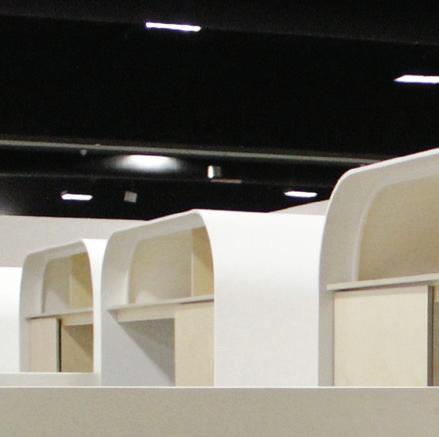

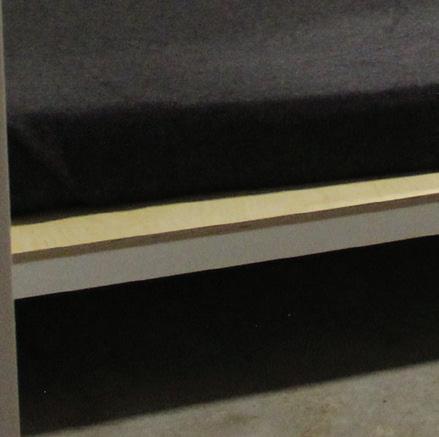

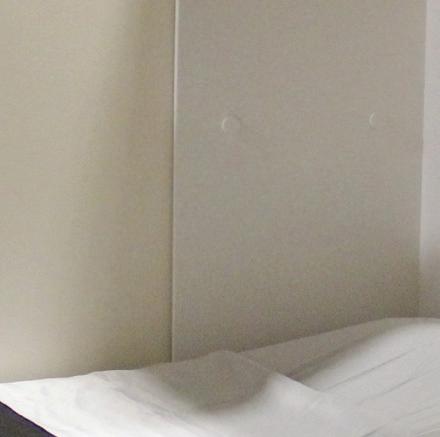
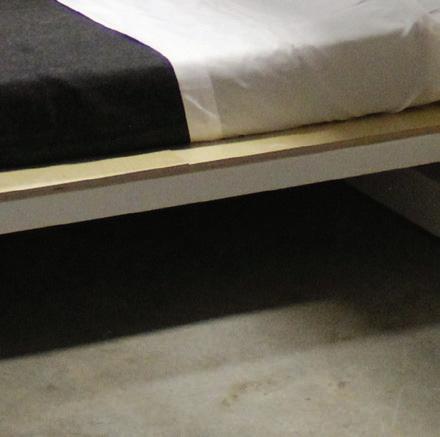




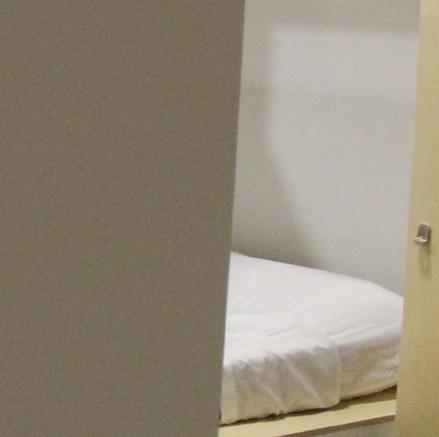
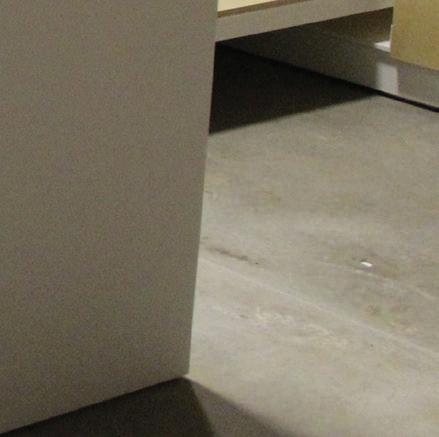


“THIS FACILITY WILL EMBODY A PEOPLE-FOCUSED, PROGRESS-DRIVEN APPROACH TO HOMELESSNESS THAT EMPOWERS AND PREPARES PEOPLE TO COME THROUGH THESE DOORS TO IMPROVE THEIR CIRCUMSTANCES, NOT A HANDOUT, BUT A HAND UP.” – MAYOR MIKE COFFMAN
BY CASSANDRA BALLARD, Sentinel Staff Writer
Community leaders from Aurora and the region last week celebrated the grand opening of the Aurora Regional Navigation Campus, a new facility designed to help homeless people reach their personal, highest level of self-sufficiency through what proponents say is a hybrid approach to addressing homelessness.
The former Crowne Plaza Hotel and Conference Center on the northeast Aurora and Denver border has been transformed into a support hub offering shelter, health care, employment services and pathways to permanent housing.
“This facility will embody a people-focused, progress-driven approach to homelessness that empowers and prepares people to come through these doors to improve their circumstances, not a handout, but a hand up,” Mayor Mike Coffman said.
The project was made possible through House Bill 22-1378, which created a $50 million grant program to develop regional navigation campuses across the Denver metro area. Aurora received $15.4 million from the Colorado Department of Local Affairs to purchase and renovate the facility, with additional funding from Adams, Arapahoe and Douglas Counties, each contributing federal American Rescue Plan Act or ARPA dollars.
Colorado Lt. Gov. Dianne Primavera said the project is a model of collaboration.
“A facility that represents hope, dignity and a true commitment to serving some of our state’s most vulnerable residents,” she said. “Residents will have access to not just a bed for the night, but vital health care, including medical respite beds in an on-site clinic, case management, employment supports and a path to independence.”
Primavera said Aurora’s center joins four other regional facilities and reflects “a Colorado where everyone has the opportunity to thrive.”
The massive renovation turned the hotel, at 15500 E. 40th Ave., near Chambers Road and Interstate 70, into a multi-tiered program designed to move participants from homeless
crisis to self-sufficiency.
The campus is what city officials refer to as a “hybrid model” offering a “no strings” homeless shelter and, in addition, on the same campus, work-first housing in rooms at the former hotel. Numerous vetted studies over more than a decade insist that so-called “housing-first” programs are more effective at getting people off the streets and moving toward long-term self-sufficiency than so-called “work first” programs. Proponents of “housing-first” approaches argue that immediate stability provided by getting off the streets makes drug and alcohol rehabilitation and job attainment more successful.
Homelessness experts say this type of “hybrid” approach requires more studies to understand effectiveness.
Coffman said the facility is a huge achievement and credited Elly Watson, assistant director of Public Works, Allison Zamaitis, the former grants compliance officer for Aurora, Emma King, homeless division manager and Jessica Prosser, director of housing and community services, among the city’s staff for bringing the project to life.
“We’re grateful to every partner who made this possible,” he said. “This building has come a long way from being a hotel just last year.”
The city selected non-profit organization Advance Pathways as the site operator after a competitive bid process. The group also runs the Aurora Day Resource Center and brings, as Coffman called it, “a holistic, accountability-based approach.”
Advance Pathways CEO Jim Geobelbecker said the center is built on three philosophies, he calls “tiers”: compassion, courage, and commitment.
Tier One is called the “compassion” level and aims to meet basic needs with few requirements from those accepting the basic shelter services. This tier is displayed as a shelter, restructuring large conference rooms into spacious rooms with cots, lockers and bathroom and shower-
ing spaces.
There are 285 cots.
Tier Two, called the “courage” level, requires engaging with case managers and peer coaches. In this tier, people move from cots to beds in large dorm-like spaces with additional storage and cubby space, and they are called pods. The beds are built with walls on three or four sides for a little extra privacy.
There are 114 pods.
Tier Three is called the “commitment” level and offers long-term, independent living additional commitments, including a requirement to hold a full-time job. This tier allows individuals to move into single and two-bed hotel rooms on the campus. People in this tier are given a separate entrance, private parking, and a shared kitchenette/living room with a fridge, microwave and televisions.
There are 220 rooms in tier three, some of which are used for staff. The campus’s capacity for those using the entire shelter is 600 people.
“We believe in earning your way forward,” Geobelbecker said.
The campus includes a computer room with job-finding resources and employees who will help with resume building, job hunting and other job-related resources. There is the “navigation center,” a large resource room for people who need identification paperwork, job certifications, such as bloodborne pathogen certification to help become a janitor, and certifications in video and drone, HVAC, flagging, forklift and doula work through Pride Initiative.
There are also dental services, health resources, GED classes through the Aurora Library, compassion rides, bus passes, Arapahoe/ Douglas works for jobs resources, a detox center, HEART court diversion program through Aurora, Dogstar holistic work for mediation and yoga, along with a dog sitting center.
Dog sitting is free, including quarantine, veterinary services, food, grooming, a dog run, and animal training, as long as each owner volunteers three hours a week in the dog area.
“We don’t want to separate people from their family,” Jessica MacDonald, an Advance support coach, said.
The campus will have a single entry point with a security scanner for weapons. Geobelbecker said there will be no drug screening or curfew for people in tiers one and two upon entry, although they are not allowed to bring in drugs or alcohol, and those substances will be confiscated. He said the goal is to give people some form of structure they may want.
There is drug and alcohol screening for tiers two and three in their respective programs, and tier three has its own private entryway with separate security.
There is also a lot of outdoor space at the facility for smokers and outdoor exercise, and Geobelbecker said that, down the road, he hopes to put in a basketball court and a community garden. Advance also kept the hotel gym and grand piano for personal use.
The philosophy of “hand-up” not “hand out” is built on second chances, with a no-strike system for infractions. People will be asked to leave if they do not follow the rules, but they will be allowed back.
Some jobs will be offered on campus, such as janitorial work, but there are no work-for-stay jobs. The majority of people will be encouraged to seek work outside the campus to achieve their “highest level of self-sufficiency.” Officials said that people with disabilities and older adults will only be required to work as much as they can.
There is also no limit on the length of people’s stays. People will be working with social workers to secure housing away from the campus, but it will be at their own pace.
There will be 62 staff working on the campus and 10 security personnel. About 85% of its staff are in some version of recovery themselves and serve as peer mentors.
“This work isn’t just about services,” Geobelbecker said. “It’s about reshaping lives and neighborhoods. Right now, we want to be able
to provide the tools, the structure and the belief in their own potential. Each person we work with, we want them to be able to move forward and stay forward.”
He said individuals at the campus will have access to job training, including janitorial certification and culinary programs, with the first cohort beginning later this month.
Chantelle Anderson, Advance Pathways’ director of programs, shared her personal story of addiction, homelessness and recovery, and why the program relies on people with lived experiences.
“I like to share a piece of my story, not because it’s perfect, but because it’s proof that no matter how
A political dispute among Aurora Democrats has erupted into allegations of racial bias, online harassment, name calling and political interference involving two state lawmakers.
The week’s long political melee began when an inflammatory text conversation between Aurora Public Schools Board candidate Anne Keke and fellow APS board candidate Kristin Westerberg was leaked to the media, the public and even posted on social media.
In the back-and-forth text, Keke comments on longtime Aurora Community activist, political candidate and now legislative aide Hashim Coates, a Democrat, not including her campaign in a social media general election endorsement post.
During the text conversation, Keke said that Westerberg was “controlling” Coates’ political opinions and actions.
At one point in the terse exchange, Westerberg calls Keke a “condescending bitch,” according to the texts and references made to them.
Coates said the dustup became public on Facebook and led to Aurora Democratic state Rep. Michael Carter attempting to pressure his employer, Colorado Springs Democratic Rep. Regina English, to rein in Coates’ political speech following an online endorsement post he made in October.
Coates called the outreach an effort to “leverage” his supervisor to suppress his First Amendment rights.
“English, what are your thoughts on Kristin Westerberg calling Dr. Keke a “condescending bitch” and your aide defending the white woman?” said Colorado Rep. Michael Carter in a Black Caucus chat with a mention of @Representative Dr. Regina English.
Carter denies that he in any way was trying to threaten Coates’ position by reaching out to English.
According to Coates and other Democrats, the controversy began Oct. 14, when he posted a “voter guide” on Facebook endorsing several candidates in Aurora’s upcoming municipal and school board elections.
In Aurora Public Schools, seven candidates are running for four at-large seats. Five of the candidates are Democrats or supported by Democrats, including APS Board President Anne Keke.
Many of the Democratic candidates for school board and Aurora City Council have supported blocks of candidates, but the candidates have not run as a bloc. Republican candidates for city council and school board have run in a bloc, appearing together in regional advertisements, including ads in the
far you fall, there’s always a way to rise again,” Anderson said. “I lived in survival mode, slept under stairs, behind dumpsters, wherever I could find warmth. I’d stop at shelters long enough to shower, get a meal and then go back outside, for I found it safer to be on the streets than in the shelter as a woman.”
Anderson’s journey, from homelessness to leading recovery programs, illustrates the very mission of the Navigation Campus: finding your way in your own time.
She said she faced abuse, addiction and incarceration. In her darkest moments, she held onto hope because she wanted to get her children back after losing them to drug addiction and homelessness.
“No one sits in a position of power
Sentinel.
Coates, in his “Voter Guide,” endorsed APS school board candidates Tramaine Duncan and Kristin Westerberg. Duncan is an incumbent. Westerberg was the former chairperson of the Arapahoe County Democratic Party.
Coates has been a visible Aurora Democrat for several years, having run unsuccessfully in the past for offices, including Aurora City Council, state representative and most recently, Arapahoe County commissioner.
Coates, a progressive, has been involved with or at the center of disagreements with other local Democrats on and off for years.
He said last week that shortly after he posted his Voter Guide, he received critical texts from Keke Oct. 18, who was upset that Coates did not include her in his endorsement.
“This is Great!” Keke said in a text to Coates. “You are trying your absolute best to pick a fight with me. Won’t work, my friend.”
The texts were sent to Coates after Keke had a text conversation with Westerberg and accused Westerberg of “controlling” Coates, as he alludes to in his text messages to Keke.
Coates sent back caustic messages calling Keke self-centered and “narcissistic.”
The Sentinel has examined the texts, or screen shots of the texts.
The text from Coates was extensive, mostly expressing anger at Keke for saying Westerberg controls him.
The exchange referenced Westerberg saying she doesn’t know why Coates made a social media voter guide, and that she is only sharing the one with all four Democrat candidates.
“That’s between you and him,” Westerberg wrote to Keke. “I don’t know why he did that. Honestly. Everything I share has all four of us. Punch him,” adding a comic emoji.
Keke responded, saying, “That’s not between me and him.” She added that she has nothing against him, and he can provoke people, but it won’t work on her. Westerberg said, “fair enough,” and “he is who he is,” and does what he wants.
“And you all are using him,” Keke said in response.
Westerberg questions the statement, saying that Coates is her friend and neighbor and that she doesn’t control him.
Keke responded to Westerberg’s comments about not controlling Coates by saying, “Right.” She also said, “I’m sure he is your friend, sis,” and “Oh, okay,” in response to Westerberg saying she and Coates are friends.
The way the screenshots were cut, it was unclear whether much else was ›› See METRO, 6
to look down on you,” Anderson said. “Sometimes we just need someone to believe in us long enough for us to believe in ourselves again.”
The Aurora Regional Navigation Campus officially opens Nov. 17, welcoming its first guests into what leaders hope will become a national model for addressing homelessness. On the same day, the Aurora Day Resource Center on the Fitzsimons campus will completely close its location.
“Colorado and Aurora continue to step up. You’re demonstrating that ending homelessness is not just possible, it’s imperative,” said Lt. Gov. Primavera. “This campus is more than a building, it’s a lifeline, and together, we’re creating a Colorado where everyone has the opportunity to thrive.”

• GreatBurgers
• GreatBurgers
• GreatCheesesteaks
• GreatCheesesteaks
• 20 TV’s
• 20 TV’s
• Open St age EveryThursday
• Open St age EveryThursday
• Saturdays:11:30AM-3PM
• Saturdays:11:30AM-3PM
FreeDomesticBeeror
FreeDomesticBeeror
Soda With SandwichOrder
Soda With SandwichOrder


All County offices will be closed Thursday, Nov. 27 and Friday, Nov. 28 in observance of the Thanksgiving holiday.

Help a Neighbor in Need this Winter
For individuals in need of extra assistance, snowy walkways and driveways create a safety hazard and can even be life-threatening. This program is one of the County’s most requested for volunteers and your help will have a big impact on your immediate community. Volunteers are especially needed in Aurora, Greenwood Village, and Centennial. Learn more and sign up at arapahoeco.gov/digout.


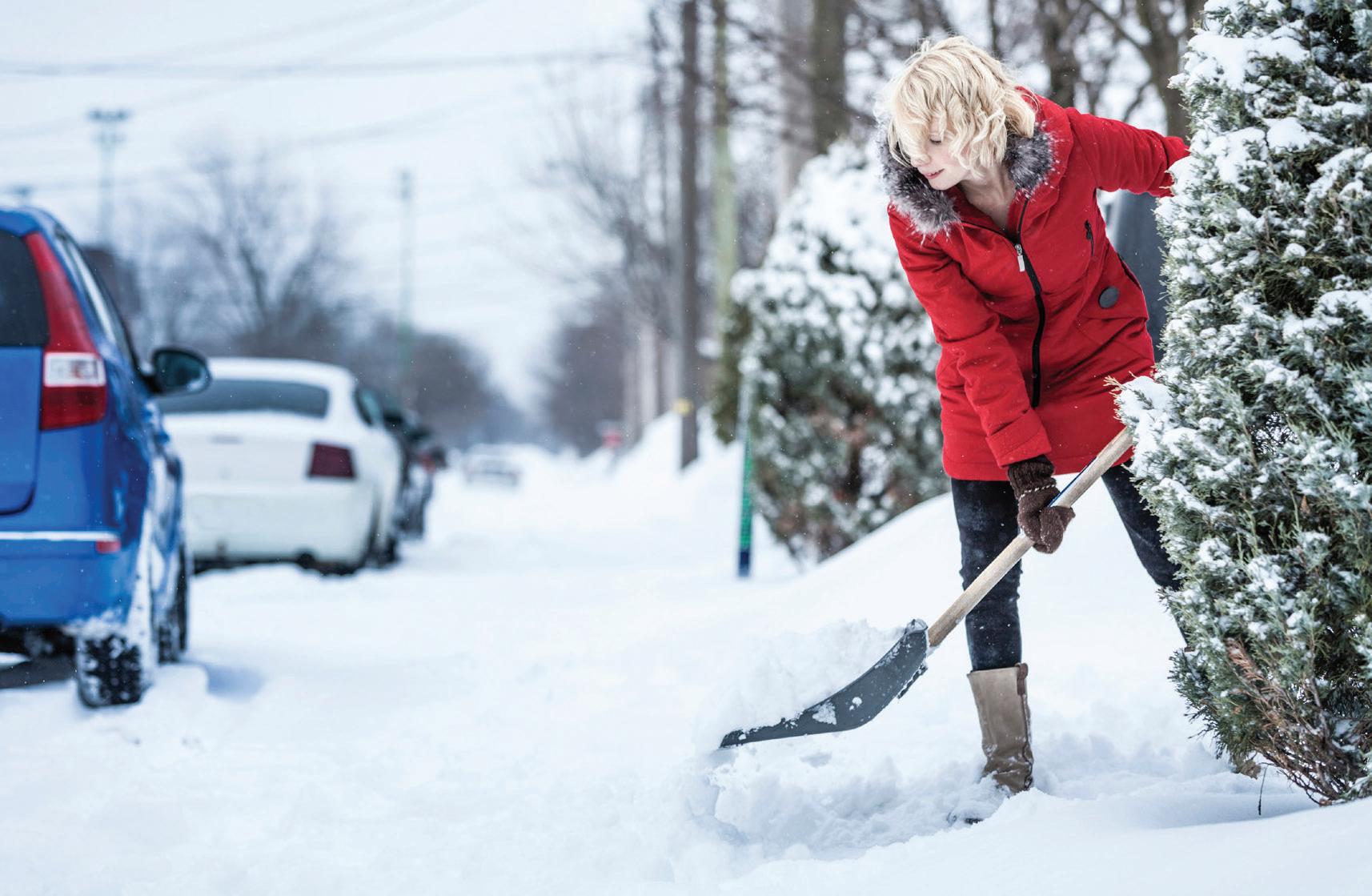








Share the Season with Neighbors in Need!
We’re partnering with generous community members like you to provide presents to children and adults experiencing financial hardship. Help your community by donating an unwrapped gift or choosing from our Amazon wish list. Visit arapahoeco.gov/partnering or scan the QR code with your smartphone.

said before Westerberg responded with the comment that outraged multiple people over the next few days.
“You’re being a condescending bitch,” Westerberg said. “Don’t insult my intelligence.”
Keke asked if Westerberg had just insulted her.
APS school board candidates Anne Keke, center in red, and Kristin Mallory Westerberg, center in purple, on Oct. 28 at a political event. PHOTO SUPPLIED
“I will take a lot of shit from people and will let you guys treat me a certain way, but don’t come after my character,” Westerberg said with ellipses that were taken out for clarity in this Sentinel report.
Keke declined to comment on the controversy for this report.
That discourse leaked out, and on Oct. 26, local activist Maisha Fields, who operates the Dayton Street Opportunity Center in northwest Aurora, reposted comments about the text on the Colorado Black Civic Engagement Commission Facebook page, which Fields and Sean Moore manage.
“It has come to our attention that Kristen Westerberg made an inappropriate, disrespectful comment referring to the president of the Aurora Public School Board, Dr. Anne Keke, as a dumb bitch,” the post reads, mistakenly using the incorrect word before “bitch.” “Such a language is not only unprofessional, but it undermines the dignity of our school leadership and sets a poor example for students and community members who look to these individuals for guidance.”
At some point, the post was re-
moved, but screenshots have since been circulated, showing the comments.
“We believe that disrespectful conduct, especially in public or professional settings, should not be tolerated.”
The post prompted Republican City Councilmember Danielle Jurinsky to “like it” and speak in support of Keke and Fields, saying she has been able to find common ground with both, along with friendship, despite political differences.
“Some of us are trying to build bridges while others want to keep the division and hatred fueled,” Jurinsky said in the post.
Jurinsky then pleaded for Aurora to keep Westerberg out of Aurora Public Schools.
The news then spread to Jeff Fard, known as Brother Jeff, who invited Maisha and Danielle Jurinsky onto his popular live-streamed Facebook show. The two discussed the situation, and Maisha said she supports Jurinsky and that they have been good friends despite their political differences. Maisha said that Jurinsky has never called a Black woman a “bitch.”
Fard’s show with Fields and Jurinsky currently has 3,900 views, according to the Facebook post.
Much of the criticism toward Westerberg implied that she was inherently racist for calling a Black woman a bitch.
Coates said he was upset about the growing reaction to his endorsements and subsequent fallout, but he was especially upset about allegations that he was controlled by someone, and the message exchange between Carter and his boss, English.
Coates said he considered Keke’s
allegation and Carter’s remark about Westerberg, referring to “a white woman” as racially offensive.
Keke “crossed a moral line, claiming my decisions were not my own and that a white woman, Kristin Westerberg, was controlling me,” Coates said. “I was raised to believe that no one owns my body or my mind. To hear another Black person make that kind of statement was deeply insulting.”
Coates said the statements “echoed the racist mythology once used to justify violence against Black men and white women.”
Coates told the Sentinel he did not support Keke because she has deep ties to charter schools, while he was publicly educated, and that he thinks charter schools drain resources from public schools. He said Keke is also tied to One Main Street, a group identified earlier this month by the Colorado Sun as a so-called dark money group, a political nonprofit that doesn’t disclose its donors.
Coates said English, whom he works for, texted him to say that Carter messaged her about Coates having supported Westerberg.
She forwarded text screenshots from a Colorado Black Caucus chat between her and Carter, questioning why her aide was “defending the white woman.” English told Coates that she had messaged Carter, saying she declined to intervene.
“She told me she supports my right to free speech and that Rep. Carter should speak to me directly,” Coates said.
English declined to respond to requests from the Sentinel for comment.
“I’m not interested in your story,
thanks,” English said in a text. “I do not do drama.”
Carter said he doesn’t see a problem with what he said and that he never threatened Coate’s job and does not consider his comments about Westerberg’s race as racist.
Another text message was sent to English from Carter via text, stating that Coates is continuously attacking him. The message was attached to a link post by Coates in a private Arapahoe Dems group, criticizing One Main Street, which Carter is a part of, and in the post, Coates said he would not be surprised if “someone” challenged Democratic state Rep. Jamie Jackson’s seat in the state house.
The Sentinel was unable to find any other public instances of “continuous attacks” by Coates.
Andrew Short, executive director of the One Main Street Colorado, liked the Facebook post involving Westerberg on the Colorado Black Civic Engagement Commission page before it was deleted.
Carter defended his support for Keke and for having asked questions about the controversy.
“As I have done throughout my career, I will continue to stand in solidarity with Black women,” Carter said in a statement. “This situation is not about me, nor is it about anyone attempting to portray themselves as a victim. It is about an individual referring to the president of my school board as a ‘condescending bitch.’
Any discussion that fails to focus on the seriousness of a prospective school board member using such language toward my board president is not a discussion worth my time.”
At the same time, many people, including Westerberg, have said that Keke and Westerberg have since made up. The two were seen getting along and laughing at each other’s jokes Oct. 30, at a school board and city council candidate panel at the Lotus for Excellence charter school in Aurora.
“A social media post mischaracterizing a private conversation between Dr. Anne Keke and me has been taken down, but some continue to spread rumors,” Westerberg told the Sentinel. “After that angry exchange, I met with Dr. Keke and apologized for my response and for using an inappropriate word. We’ve moved forward with mutual respect. My focus remains on Aurora’s students, families, and schools — and on leading with accountability and grace.”
She said that she rejects the false claim that she is racist or anti-Black, and that the attacks are deliberate distractions meant to divide and discredit.
“My record speaks for itself — I’ve spent the last decade uplifting working-class families in Aurora, regardless of race, religion, or economic status,” she said in a text. “Again, this was a private disagreement that was made unnecessarily public. Dr. Anne Keke and I have made amends and moved on.” Westerberg said she and Keke would be knocking on doors while campaigning together on Monday.
The series of confrontations has highlighted tensions within local Democratic circles, where disagreements over ideology and race have occasionally spilled into public view.
“It’s a very important election
›› See METRO, 7


















taking place in Aurora,” said Melissa Garland, chairperson of the Arapahoe County Democrats. “It’s two days away. Tensions are really high. Democrats are very passionate people and say things that they might regret. Things will be better on Tuesday when we start getting some election results.”
Coates said accusations that white political figures control Black activists have been used to discredit him before.
“Any time I don’t align with certain factions, they say I’m being manipulated,” he said. “It’s a way to delegitimize independent Black voices.”
Coates said he knew that bringing the statement to life would bring him backlash, but he was compelled to persist.
“All I wanted was to speak my truth and serve my community,” Coates said. “I was attacked, but I’ll keep standing. Our ancestors faced worse and still stood tall. That same strength runs through me. I won’t break. I’ll keep standing, speaking and serving, because my purpose is bigger than fear.”
— CASSANDRA BALLARD, Sentinel Staff Writer
Man, 19, faces vehicular homicide charges in fatal Aurora street-racing crash
A 19-year-old Denver man has faces vehicular homicide charges linked to a fatal street-racing crash early Nov. 1 in Aurora that left one man dead and two others injured, police said.
Aurora police were called to a single-vehicle rollover crash just west of East Alameda Parkway and South Chambers Road. at about 12:45 a.m., police said in a statement.
Investigators said a BMW sedan was racing east on Alameda from Sable Boulevard when the driver failed to make a curve in the road, hit a grocery store sign and rolled the car.
An adult male passenger died at the scene, police said. His name will be released later by the Arapahoe County Coroner’s Office.
The driver, Edwin Rosales-Sandoval, 19, and a 17-year-old female passenger were taken to local hospitals with non-life-threatening injuries.
Police said Rosales-Sandoval was driving under the influence of alcohol and on a revoked license from a prior DUI conviction.
He was booked into the Aurora Municipal Detention Center and faces charges of vehicular homicide, reckless driving, driving under the influence and driving while his license was revoked.
— Sentinel Staff
Police seek public’s help in locating suspect in fatal Aurora shooting
Police are seeking the public’s help in locating a man suspected in a fatal shooting in the front yard of a Del Mar Park home Oct. 24, police said.
Investigators are searching for Diego Jimenez, 26, who they say shot and killed an unidentified man in front of a house near East Sixth Avenue and Del Mar Circle.
“Officers were dispatched to the area… just after 1 p.m. where they located an adult male lying in a front yard suffering from a single gunshot wound,” Aurora Police spokesperson
Gabby Easterwood said in a statement.
“He was transported to a local hospital, where he later died from his injuries.”
Investigators said Jimenez and the shooting victim were embroiled in some kind of altercation when Jimenez shot the man.
Police said 41-year-old Sheena Fuentes faces accessory charges linked to her actions after the shooting. Police did not provide details on what those actions entailed.
Jimenez now faces charges of second-degree murder in the case, and police are asking that anyone without information about his whereabouts can call Metro Denver Crime Stoppers at 720-913-7867. Tipsters can remain anonymous and still be eligible for a reward of up to $2,000, police said.
— Sentinel Staff
Aurora police are asking for the public’s help in locating a suspect wanted in connection with a fatal shooting last week in northwest Aurora.
Police have issued an arrest warrant for Marcus Marcelles Harper McCray, 40, of Aurora, accused of first-degree murder, police said in a statement.
The shooting occurred at about 2 p.m. Saturday, Oct. 25, in an apartment parking lot in the1500 block of Macon Street. Officers responded to reports of gunfire and found a 34-yearold unidentified Aurora man suffering from multiple gunshot wounds, police said.
The victim, whose name will be released by the Adams County Coroner’s Office, was taken to a local hospital, where he later died from his injuries.
Police said investigators believe the suspect and victim knew each other. The original report described the incident as a shooting between acquaintances.
McCray is considered armed and dangerous, and police are urging anyone who sees him not to approach but to call 911.
— Sentinel Staff
Read remains at large despite investigators trying to track him down, police said.
He “remains outstanding and all leads generated to date have been exhausted,” Moylan said.
Detectives are asking anyone who has information about Read to contact Aurora police through Metro Denver Crime Stoppers or by calling 911.
“Read is considered armed and dangerous and should not be approached by members of the community,” Moylan said.
Police said anyone with information can call Metro Denver Crime Stoppers at 720-913-7867. Tipsters can remain anonymous and still be eligible for a reward of up to $2,000, police said.
— Sentinel Staff



Police are asking for the public’s help in tracking down a man accused in a July shooting in northwest Aurora that left a man injured.
Investigators are looking for Douglas Andrew Read, 39, Aurora, who police say is linked to the shooting of an unidentified 39-year-old man at a northwest Aurora apartment.
Police were called to investigate reports of a shooting at about 1:15 a.m. July 31 at an apartment on the 3100 block of Peoria Street, police spokesperson Joe Moylan said in a statement.
Police said a man there had sustained a non-life-threatening gunshot wound during the shooting.
Aurora police Gun Violence Suppression Team investigators identified two suspects in the case.
After weeks of investigation, Anthony James Neal, 48, of Aurora, was arrested Oct. 2 by the Aurora Police Department Fugitive Apprehension and Narcotics Unit. Neal faces one count of first-degree assault with a deadly weapon and is currently being held in an Adams County jail in lieu of $30,000 bond.







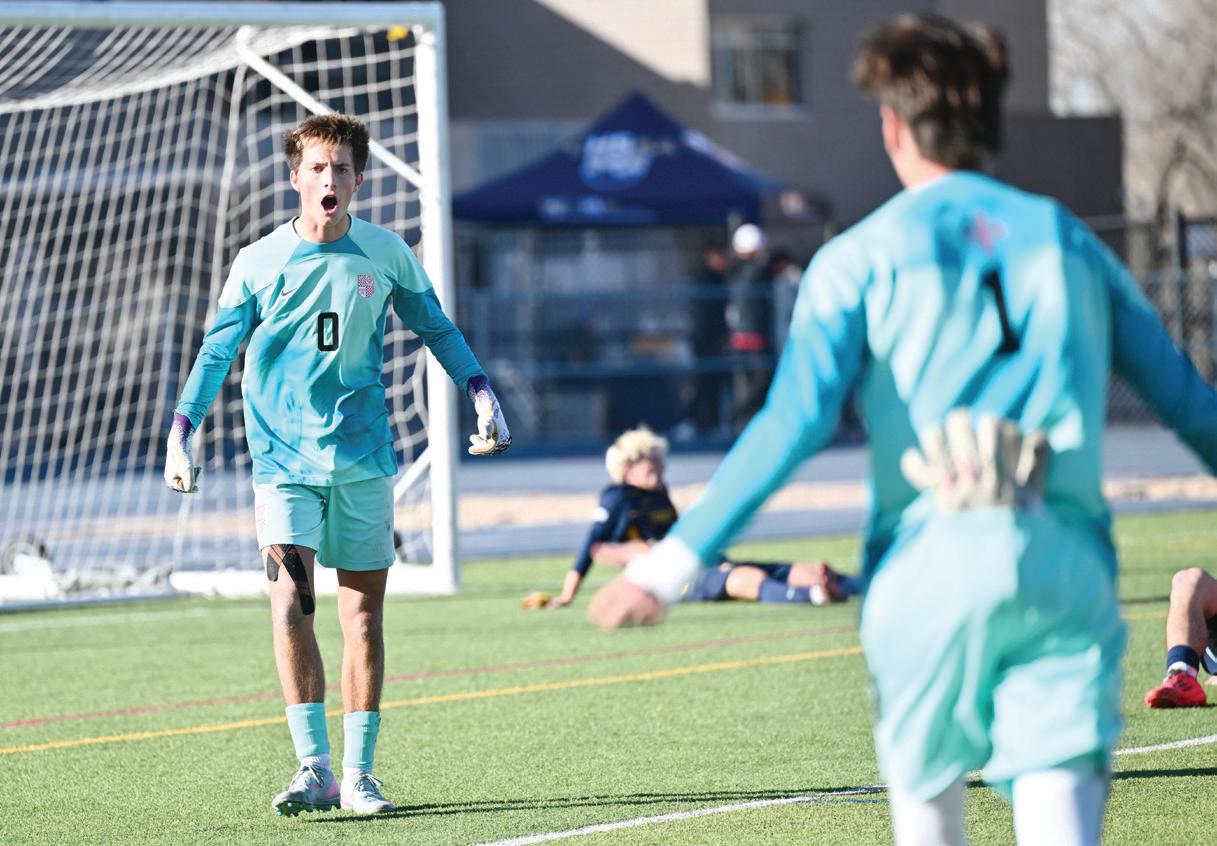

The agony in Derek Seymour’s shoulder faded into the ecstacy of jubliant celebration Nov. 8.
The gritty senior forward played through the pain and came up with the biggest play for his Cherokee Trail boys soccer team, which produced a trip to the Class 5A state semifinals.
A marathon of more than 100 minutes of scoreless play between the 12th-seeded Cougars and No. 4 Legacy at Randy Penn Stadium came to an abrupt end when Seymour ripped a shot through traffic and into the corner of the Lightning net to deliver a 1-0 win.
The game of soccer’s penchant for dealing cruel endings to teams that dominate, but don’t finish, loomed as a real possibility for Cherokee Trail.
Legacy (14-1-3) got an outstanding performance in the goal from keeper Noah Grobaski, who found many ways to thwart the Cougars in prime scoring opportunities.
In the opening half, Seymour’s long throw-in with senior Isaac Wells parked in front of the net seemed destined for a goal, but Grobaski somehow snared the ball with one arm as he lay on the turf.
Hill felt a bit of tightening in the pit of his stomach with each denied opportunity.
“It feels amazing, I can’t believe I’m here,” Seymour said of the biggest — so far — of his six goals on the season. “I broke my collarbone last year and sprained a tendon in my shoulder two weeks ago, so I’m just glad to be here helping my team the best I can.”
BY COURTNEY OAKES Sports Editor
Seymour — one of 14 determined seniors on coach Mark Hill’s Cherokee Trail — has been a huge help in the postseason.
He scored the only regulation goal in its upset shootout win over No. 5 Denver East in the second round and then got the game-winner against Legacy that lifted the Cougars (12-3-3) into a Nov. 11 semifinal match against No. 1 Ralston Valley (17-0-1) at the University of Denver.
The other semifinal pits another Aurora area team — No. 6 Regis Jesuit — against No. 7 Pine Creek with a spot in the Nov. 15 final on the line.
When the celebration had ebbed, Hill came over to Seymour with some knowing words.
“I told him ‘this is your moment, you’re going to get the game-winner, just keep going,’” Hill said. “It’s 100 percent fitting for him to get it with all he’s battling through.”
“The chances we had in the first half, it could have been a 3-0 game at halftime, but their keeper is a tremendous player,” Hill said. “Coach Alex and I were talking on the sideline that maybe it’s just not our day. We just couldn’t find the back of the net and then you worry that just one counter and they could score. But we hung on and never lost confidence.”
With junior goalkeeper Forrest Cornett (one of the big heroes of the shootout win over Denver East) and a strong backline keeping Legacy’s offense at bay, Cherokee Trail continued to attack through the closing minutes of regulation and the first 15-minute overtime period.
Finally, the Cougars’ break came.
Seymour dribbled to the edge of the Legacy goal box, then fed out to the middle of the field to Wells, who took a touch and got it back to him. Seymour settled the ball, whirled and fired a shot through a Lightning defender that beat Grobaski by a fraction of a second to get into the net.
“Center backs open their legs as soon as they see a shot, so I just went right through it and no keeper is expecting near post,” Seymour explained of only the sixth goal in 17 games allowed by Legacy.
Wells breathed a sigh of relief when the game ended
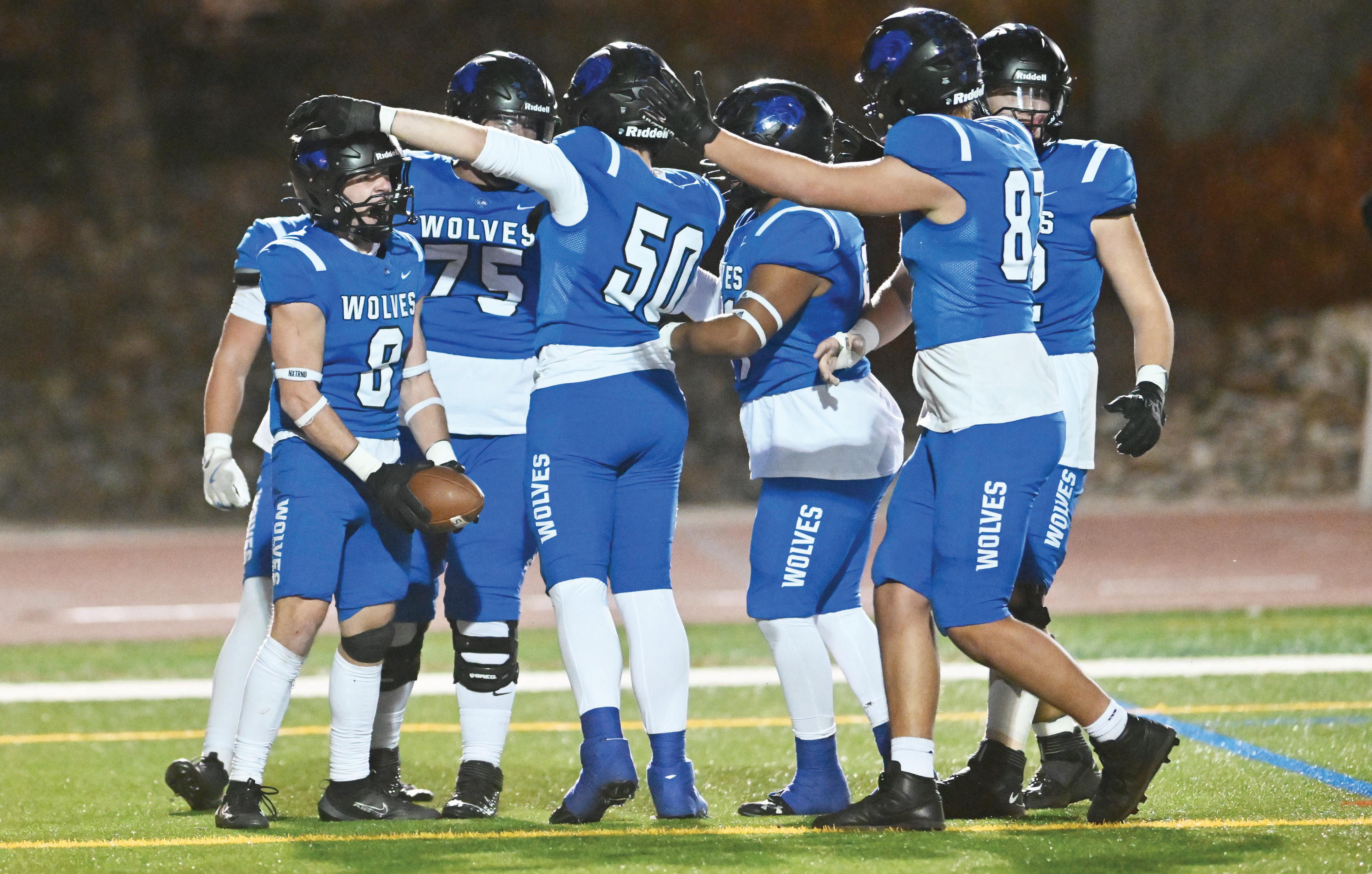
And then there were two.
The Aurora area’s representation in the Class 5A state football playoffs got cut in half by first round play Nov. 7, as 11th-seeded Grandview and 14th-seeded Eaglecrest posted home victories, while 16th-seeded Cherokee Trail and 21st-Regis Jesuit were stopped.
Now among the 16 teams left in play, the Wolves and Raptors both try to keep their season’s alive for at least another week with visits to higher seeded opponents coming off byes Nov. 14.
The Wolves sealed it on defense when junior Brody Flores scooped up a fumbled snap and took it back 87 yards for a touchdown.
It was another chapter in the traditional postseason success for Grandview, which has now won at least one playoff game in five straight seasons and in 18 of its 21 playoff trips all-time.
While Grandview’s postseason victory wasn’t that surprising considering its postseason track record, it had been quite some time since the Eaglecrest program had experienced one.
“Our mindset is really about the postseason,” said Grandview coach Tom Doherty, whose team earned a 32-13 win over No. 22 Chatfield Nov. 7 at Legacy Stadium.
BY COURTNEY OAKES Sports Editor
“It’s why we schedule the way we schedule, so we feel like we’re battle-tested. We try to get as much experience as we can and draw on it when it matters the most.”
That proved itself out when the Wolves met the Chargers, who battled back from an early deficit to forge a 7-7 tie in the second quarter. That’s when Grandview’s experience kicked in, as it launched a responsive drive to take control of the game.
Junior Maddox Johnson — pressed into action at running back due to an injury to senior Chris Blanks — finished a lengthy march to the end zone for the second of his three scores. Johnson had only one other game with double-digit carries, but got plenty of chances against Chatfield and scored three times in Blanks’ stead.
The Raptors hadn’t advanced past the first round of the playoffs since 2019, which was prior to Jesse German’s arrival as head coach, but ended the drought with a 32-10 win over No. 19 Legacy Nov. 7 at Stutler Bowl.
The 14th-seeded Raptors (7-4) had been stopped in the opening round twice in German’s tenure and two times before that stretching all the way back to a quarterfinal run in 2019.
“We took that first step, it had been too long,” said German, who came over from Green Mountain prior to the 2024 season. “We are definitely working to create a new standard here. I couldn’t be more proud of how we came out and finished in the second half.”
German coaches defense and has made it a goal to have his unit score if possible. Eaglecrest was undefeated in six games in the regular season when the defense put points on the board and it extended that streak as sophomore Cooper Shaw came up with a huge play when he took an interception back to the end zone.
The score added to senior Cameron Bell’s punt return touchdown and put Eaglecrest in control.



“I’m thinking Derek is going to get a shot on net and we keep going even if he doesn’t score, but thankfully he did,” Wells said. “I feel like we should have finished that game a lot earlier, but it ended when it needed to and we got it done.”
Cherokee Trail’s win put it in the semifinals for the second time in program history and a victory over Ralston Valley would bring the first championship game appearance. The 5A state final is scheduled for 6 p.m. Nov. 15 at Weidner Field in Colorado Springs.
The possibility of an all-Aurora final exists with the presence of Regis Jesuit in the other semifinal.
The Raiders won the only multiple-score game of the four 5A quarterfinal contests — three of which were 1-0 decisions — with a 3-1 upset win over No. 3 Northfield.
It did not come easily, however, as Regis Jesuit found itself down a goal midway through the first half against a Nighthawks team that was flying all over the pitch.
“For us to go down a goal against a team that was putting a lot of pressure on us and slowly flip the game was big,” Regis Jesuit coach Rick Wolf said. “It was a good showing by us to go down and fight through it, so I’m really proud of the boys.”
Flipping the game required scoring a goal to get even, which the Raiders were able to do with less than 10 min-
“It’s so important for us to score on defense,” said Shaw, who read a screen play he’d seen in film study, sagged back and snared the ball. “Not only does it put points on the board, it fires up the offense.”
Three touchdown runs by sophomore Clyde Surrell in the final two quarters cemented the victory, which moved Eaglecrest into a second round contest against third-seeded Mountain Vista (10-0) at 7 p.m. Nov. 14 at The Stadium at Redstone Park.
Cherokee Trail got to play host to its first home game in five years, but it didn’t help coach Justin Jajczyk’s team advance as it fell to 17th-seeded Fountain-Fort Carson 14-7 at Legacy Stadium.
The Cougars (4-7) had come through a gauntlet of a regular season in which nine of their 10 opponents were postseason qualifiers.
Largely, Cherokee Trail shut down the Trojans save for two drives, one late in the second and the other early in the third. Despite four trips to the red zone, the Cougars could not keep pace, however, as they were held to only a touchdown run by junior Nico Mavromat late in the second quarter.
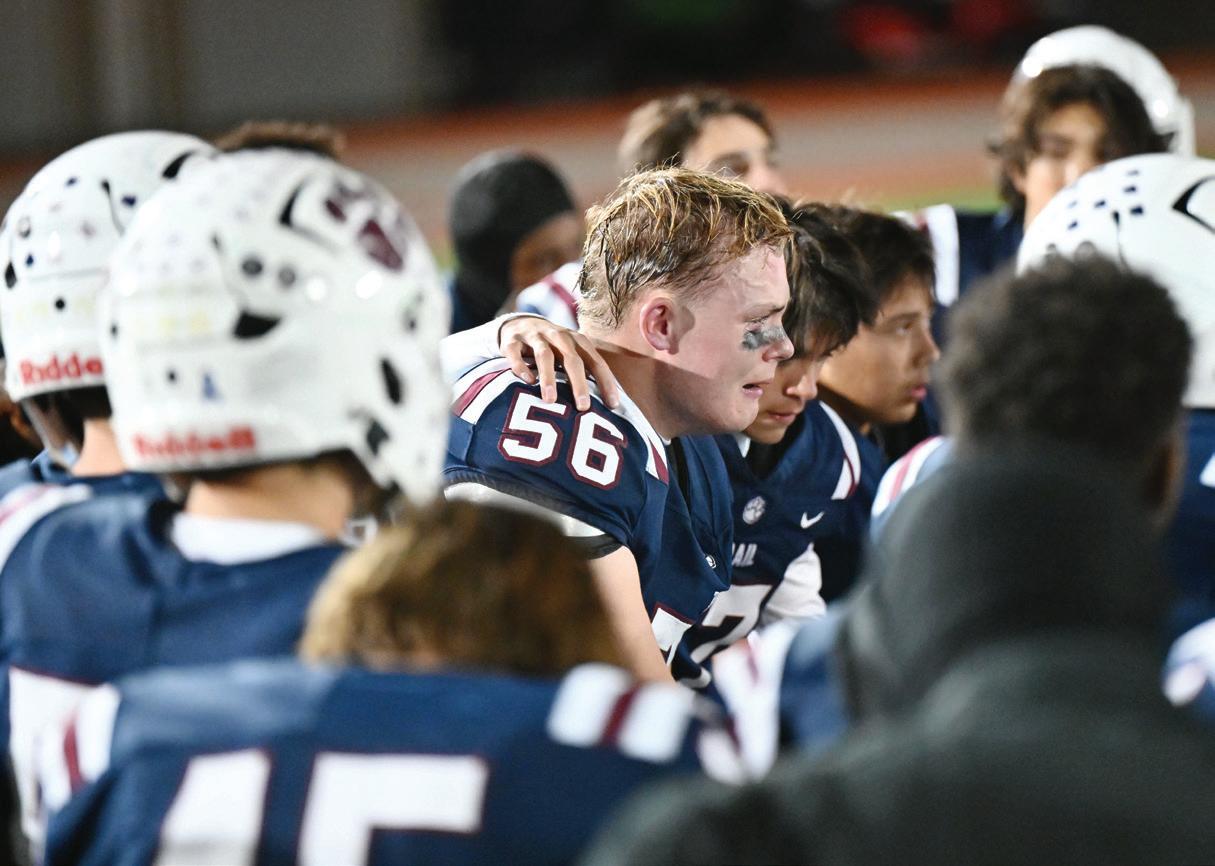
we played and we just came up a few plays short of taking advantage of our opportunities.”
For full playo coverage, visit sentinelcolorado. com/preps
“We had opportunities that we missed and there were definitely things we couldn’t convert,” Jajczyk said. “That was a good team
With 12 sophomores in the starting lineup, Cherokee Trail seems set up to learn from the experience and use it in the future, though it will miss players such as senior running back Logan Posey, who ran hard and picked up 113 yards while coming up just short of breaking free on several carries that could have been touchdowns.
Regis Jesuit also had a young team that actually got the jump on a high-
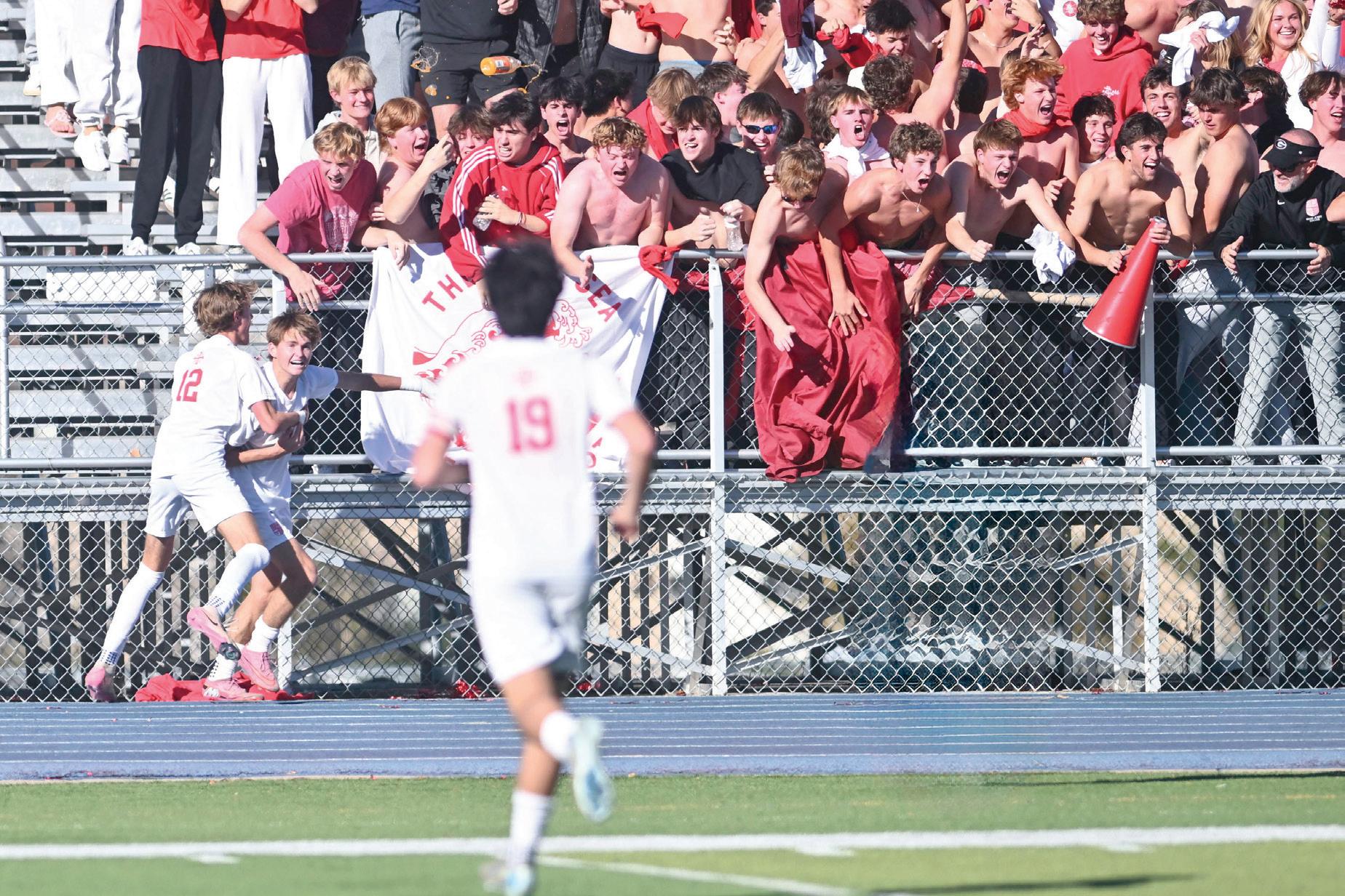
utes remaining in the opening half.
Senior defender Cameron Sim redirected junior Jackson Huguelet’s free kick service with his head and it made it through a thicket of defenders and into the net.
“They came out and punched us in the mouth and got that first one, but we bounced back,” Sim said. “It was a good ball by Jackson and I had to go up and go get it. That really
started it and then Kam Bachus really followed up after that.”
Junior keeper Marcus Huguelet and the Regis Jesuit defense survived a dangerous flurry in the last 10 seconds from Northfield and went into the lockerroom buoyed with momentum.
The aforementioned Bachus moved from the midfield to a forward spot and played like a “monster” in Wolf’s words in the second half.
Buoyed by a significant Regis Jesuit presence in the stands, Bachus broke the tie in the 53rd minute. A strong bit of Regis Jesuit pressure saw junior Sawyer Berg pass the ball across the goal box, through the legs of senior Jackson Schneller to Bachus, who found control and
“My buddy Jackson (Schneller) left a perfect dummy and I thought I took too many touches at the start,
er-seeded opponent, as the 21st-seeded Raiders got a field goal from senior Jack Manthey to take a 3-0 lead over host and 12th-seeded Erie.
But coach Danny Filleman’s Regis Jesuit team — which averaged more than 27 points per game in the regular season — came up empty offensively for the rest of the contest in a 20-3 defeat that ended its season at 4-7.
It was the first time Regis Jesuit hadn’t made it into at least the second round via win or bye in a full season (minus the 2020 season where only eight teams made the postseason) since 2011.
but was able to put in the roof of the goal,” Bachus said. “Then I got to run over to all the fans who came out to support us. It was incredible.”
The deafening sound on one side of the stadium was countered by the quiet on the other side, which turned into virtual silence when Bachus struck again in the 73rd minute. He broke out of a tie with senior Rory Schmeider for the team lead in goals with his 12th of the season, which came on an outstanding individual effort in which he took advantage of a Nighthawks team that was in a desperate push to equalize.
“In a game like that, you never know what can happen in those last couple of minutes, so you want to try to build the lead when you can,” Bachus said.
Regis Jesuit put the disappointment of a second round to Broomfield last season behind it to moved into the semifinals for the second time in the past three seasons.
“The roster we had last year and the talent on paper didn’t pan out in our last game,” Wolf said. “These guys probably aren’t as glitzy as that team was, but they work hard and there’s no ego. They play for each other.”
Added Sim: “This really helped boost our confidence. Whoever we play next week (Pine Creek, which upset defending champion and second-seeded Chery Creek) is going to be a really good team. We just have to go after it like we did today.”
Overland gets season’s best score on way to 4th place at 5A state meet
The start wasn’t the best for the Overland gymnastics team in the Class 5A state team competition Nov. 6, but the finish was fantastic.
The Trailblazers closed their rotation at Thornton High School with a rousing score of 45.350 points on the balance beam — the second-highest score of any of the 10 teams that competed in the event — and easily achieved their best team score of the season in the biggest meet.
Coach Lisa Sparrow’s Overland team — an assembly of athletes from several schools in the Aurora area — finished with a score of 177.050 points, which put it in fourth behind champion Broomfield (182.275), runner-up Chatfield (179.175) and third-place Mountain Range (178.200), which had been in search of a third straight team championship.
“We knew we had a lot talent and potential and we’d done the work, so we were able to let it shine,” said Sparrow, who had tremendous turnover from last season’s team that finished in second place. “We didn’t have the best start with a couple of mistakes on bars, but we came back and did well on the floor and then absolutely knocked it out of the park at the end on beam.”
Overland indeed saved its best for last with its top score coming on the beam, which surpassed the 44.850 in the floor exercise and the 44.475 on the vault, while it finished at 42.375 on the uneven bars.
The Trailblazers had a placer in the all-around competition in junior Abby Mess (Eaglecrest), who accrued a score of 36.150 to place sixth. Mess — who won the Region 1 all-around championship a week earlier — qualified for the Nov. 8 individual event finals (which featured the top 15 scorers during the team competition) on the vault, floor and balance beam. She did not place on the podium in any of them with a best finish of ninth on the beam.
Sophomore Stephanie Fernandes (Grandview) made the individual event finals on beam and floor, while senior Haylie Lawrence (Smoky Hill) made it on the beam. Neither earned places on the state medal podium.
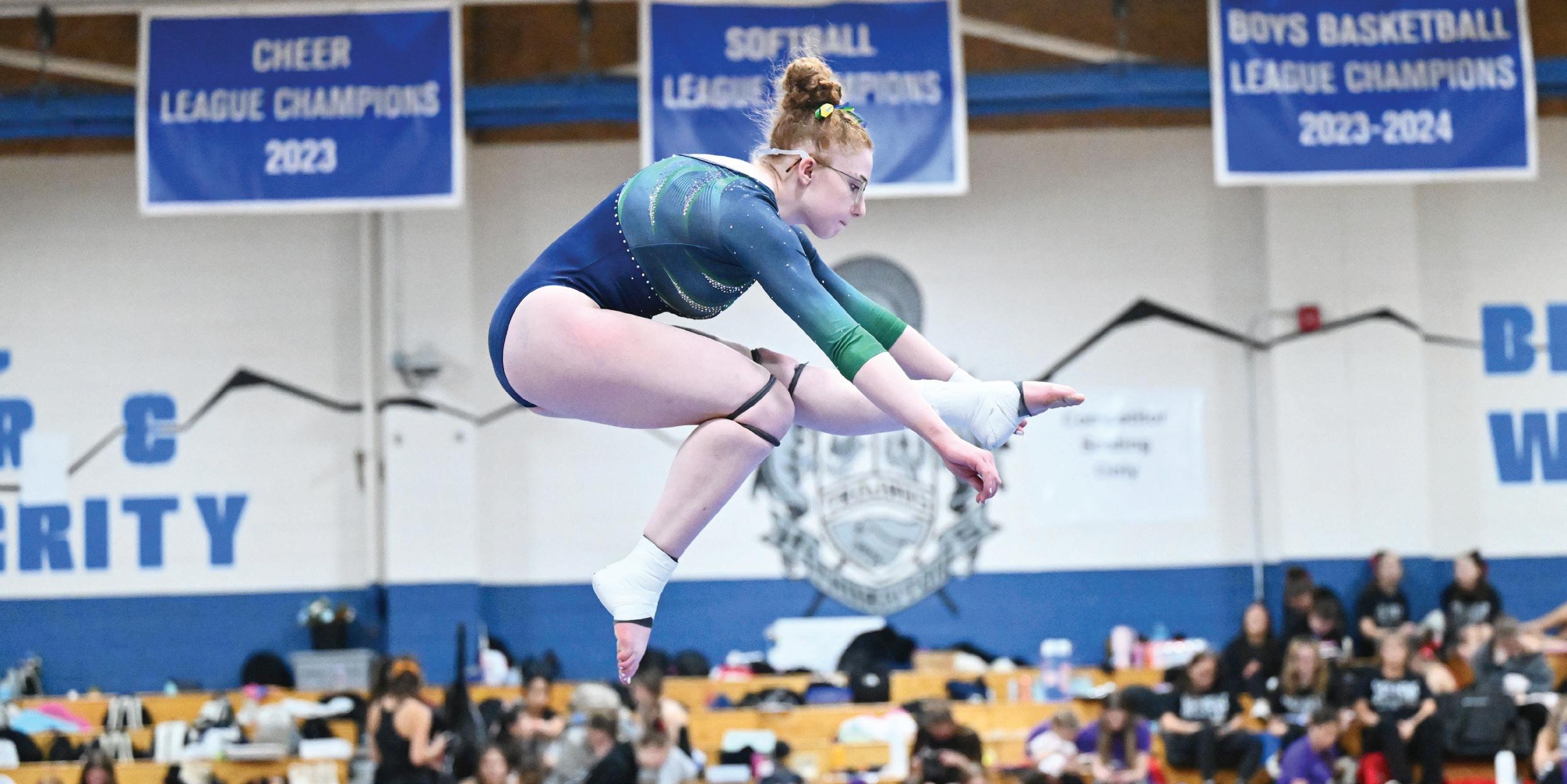

-15 5A state tournament at the Denver Coliseum, but none hail from Aurora as No. 19 Cherokee Trail, No. 27 Eaglecrest and No. 32 Vista PEAK Prep failed to make it through road regionals.
For full playo coverage, visit sentinelcolorado. com/preps
Overland’s showing encouraged Sparrow, who loses a total of four seniors, including two that competed routines in the team competition.
“We’ll have a lot of strength coming back plus some good potential freshmen coming in,” Sparrow said. “This should give us momentum and excitement for next season.”
Aurora area teams left out of 5A state tournament for first time in nine years
Not since 2017 has a Class 5A girls volleyball state tournament taken place without at least one Aurora area qualifier, but it will happen this season.
Twelve teams advanced from 12 different regional sites to the Nov. 13
Coach Amber Cornett’s Cherokee Trail team aimed to return to the state tournament after it qualified in 2024 and had to make it through two teams at the Nov. 7 Region 6 tournament at Ralston Valley to do so. It was not to be as the Cougars were able to down 31st-seeded Golden 25-13, 2825, 25-11, but lost in four sets (25-18, 20-25, 25-20, 25-13) to the host and sixth-seeded Mustangs. Cherokee Trail’s finished with a 15-9 record. Fresh off a runner-up finish in the Centennial League Challenge, Eaglecrest tried to put an end to a state tournament drought that stretched back to 2018, but finished 0-2 Nov. 8 in the Region 10 tournament at Pine Creek. The host and 10th-seeded Eagles swept coach Sarah Nance’s Raptors (14-11) in the first match (25-18, 25-19, 25-17), while No. 15 Monarch outlasted them 25-17, 14-25, 25-23, 24-26, 15-9 in the second.
Additionally with a loss by No. 25 Cherry Creek in the Region 12 final, the Centennial League was held out of


the 5A state tournament completely. League champion Mullen is the No. 6 seed in the 4A tournament, however.
Vista PEAK Prep remains in search of its first-ever state tournament berth in any classification as it lost two matches at the Nov. 8 Region 5 tournament at Rampart. Coach Simon Moorwood’s Bison — playing in regionals for the first time since 2022 — lost to the host and fifth-seeded Rams 25-18, 25-16, 25-13 and then to fellow City League program and 20th-seeded Northfield 25-20, 25-17, 27-25.
Despite the loss, VIsta PEAK Prep led Aurora area teams in wins and finished 16-9.
BOYS SOCCER Meteors fall in 2nd round of 2A state tournament
The Lotus School For Excellence boys soccer teamd exited the Class 2A state playoffs in the second round Nov. 5. The eighth-seeded Meteors played host to No. 9 SkyView Academy surrendered a goal in each half of a 2-0 loss. Coach Chris Nguyen’s team finished 12-3-1.
TOP: Junior Abby Mess perfoms a wolf jump during her routine on the balance beam for the Overland co-op gymnastics team at the Class 5A state meet Nov. 6 at Thornton High School. Mess finished sixth in the all-around competition. ABOVE LEFT: Lilly Van Luit makes an attempt for Overland during the vault competition at the 5A state meet. ABOVE RIGHT: From left, Stephanie Fernandes, Josie Arlt, Lindsie Gray, Scarlett Matthies and Haylie Lawrence react to teammate Abby Mess’ performance on the balance beam during the 5A state meet . RIGHT: Lotus School
For Excellence senior Luke Tenkorang (20) settles a ball near midfield alongside freshman teammate Martin Valdez (19) during a Class 2A boys soccer second round state playoff game on Nov. 5. The host Meteors lost to SkyView Academy 2-0. (Photos by Courtney Oakes/Aurora Sentinel)
Ice hockey practices opens winter season
The 2025-26 winter prep sports season officially began — at least for one sport — on Nov. 10. The Colorado High School Activities Association allowed ice hockey teams to begin tryouts and preparation for the season on Nov. 10, while the remainder of the winter sports (boys and girls basketball, boys and girls wrestling and girls swimming) can begin Nov. 17.
BY CALEIGH WELLS, Associated Press
The whole “pets are family members” idea isn’t just a sweet sentiment. Data shows that pet owners are increasingly buying food that resembles their own diets.
The trend toward refrigerated, “fresh” or even “human-grade” pet food can come with a price beyond the pet food budget.
One of the most climate intensive decisions we make is whether to own a pet. It’s for the same reason that humans have a big impact: They eat every day. And most of them eat meat. The environmental impact of meat includes the land the animal lived on, the food it ate, the waste it generated and other factors.
“What else do pets do? We have to feed them. I think that that’s why it’s number one,” said Allison Reser, director of sustainability and innovation at the Pet Sustainability Coalition.
But just like people, a pet’s impact on the planet can vary greatly depending on their diet.
Does human-grade mean better?
The marketing of higher-quality pet food suggests that it’s healthier.
But there isn’t much evidence to suggest refrigerated, fresh or human-grade food leads to better pet health outcomes, according to Alison Manchester, assistant clinical sciences professor at Cornell University’s College of Veterinary Medicine.
“I think a lot of it is playing on marketing and treating pets as members of the family,” said Manchester.
She said traditional kibble and wet food can also provide a perfectly balanced pet diet, and it often makes use of animal parts that aren’t palatable to humans and otherwise might have been wasted.
Billy Nicholles, pet food researcher with Bryant Research, said the trend of using human-grade meat in pet food increases its climate impact because pets aren’t just eating animal parts that would have otherwise gone unused.
“We definitely can’t dismiss these impacts altogether by just saying these are the offcuts, these are environmentally negligible,” he said.
Reducing your pet’s climate pawprint
In the U.S., feeding dogs and cats
accounts for more than a quarter of the environmental impact from meat consumption. The pollution created from the meat that dogs and cats consume in the U.S. is equivalent to the pollution created from driving 13.6 million cars for a year, according to a UCLA study.
One common and easily-solved problem is giving less food to overweight pets.
“Not only does (overfeeding) mean that the dog’s going to have a poorer quality of health,” Nicholles said. “It also means that we’re increasing to those environmental impacts as well.”
The American Kennel Club said diet makes up the majority of a dog’s weight problem, so fixing it relies mostly on making sure it’s eating the right number of calories (treats included).
Protein should make up roughly 18% of an adult dog’s diet and roughly 26% of an adult cat’s diet, according to the Association of American Feed Control Officials.
Manchester said it’s possible for dogs to be healthy on a vegan diet.
“Dogs can get plenty of protein and the right balance of protein without actually ingesting any meat,” Manchester said.
Cats rely more on animal products. Manchester said she doesn’t know of a balanced, commercially available vegan cat food. That means minimizing their impact comes from choosing less pollutive meat options when possible. Beef is the most pollutive protein. Chicken and fish are lower-impact, and plant-based options pollute the least.
Manchester also recommends buying pet food instead of making it at home or feeding pets table scraps. She said that there’s “a lot of room for error” with balancing the nutrients in homemade pet food that can lead to nutrient deficiencies, bone or heart problems and other health issues.
For those looking to avoid human-grade dog food, Reser said to check the label and avoid ingredients that sound appetizing to humans, such as high-quality chicken breast meat. Ingredients such as organ meats or crickets indicate that the protein is coming from byproducts or more sustainable sources. These steps can be done when shopping at grocery stores or large pet sup-






ply stores.






But for those who want to go further, some of the most sustainable brands might cost more, or require more research because they aren’t available in physical stores or on major websites. Some may require a vet’s prescription.
The brands that focus on sustainability might have labels that show they are climate neutral certified, that they’re regenerative organic certified or that they’re a certified B Corp.
Diet isn’t the only factor to consider. The type of pet, its breed and where it came from all affect its impact.
For example, buying a dog from a breeder creates demand for that breeder to make more dogs. Nicholles said a dog in a shelter already has a “priced-in” carbon impact.
“If there are dogs in the world that already exist that need homes, that seems to be a more responsible decision for the planet than going through a breeder,” said Reser. Nicholles says, generally, the smaller the pet, the smaller the carbon footprint.
For some pets, size just doesn’t change much. Most cat breeds fall into a narrow size range. But dogs can vary greatly in size, and thus climate impact. Smaller dogs not only eat less, but create less waste and use crates and other accessories that require less material to make.















“It matters a lot, for the slightly obvious reason that a larger dog is going to be eating many, many more calories,” said Nicholles. Reser said accessories that come from regenerative, durable or recyclable materials can often have a lower impact and need less frequent replacement.
Or, for a cat like Reser’s that gets bored of toys quickly, try a completely different tact.
“I make her toys out of trash, honestly,” she said. “Like a piece of newspaper or a receipt, she loves.”

The Pond Ice Rink opening celebration
Bundle up and glide into the winter season as The Pond Ice Rink opens for another year of outdoor skating in Aurora. Families and friends can enjoy public sessions under the lights, complete with music, hot chocolate and cozy fire pits. The seasonal rink has become a favorite local hangout, offering lessons, hockey sessions and themed skate nights throughout the season. Whether you’re a beginner or a pro, it’s the perfect place to celebrate winter fun.
IF YOU GO: Opens Nov. 8. 6155
S. Main St. $15 admission includes skates and rink time. Details at thepondicerink.com
Step millions of years into the past during the Prehistoric Eras Tour, a lecture series tied to the museum’s “Prehistoric Aurora” exhibition. Local scientists and paleontologists will guide
visitors through Colorado’s evolving landscape, from the days when trilobites roamed ancient seas to the Ice Age giants that once walked the Front Range. Attendees can explore real fossils unearthed during Aurora construction projects and learn how shifting climates shaped the region. The talks are designed for families, students and anyone curious about the deep natural history beneath their feet.
IF YOU GO: Nov. 6, 7, 8 and 12. Times vary. Aurora History Museum, 15051 E. Alameda Parkway. The Event is free. Details at auroramuseum.org
The holiday season begins early with the Festival of Wreaths, a long-running fundraiser and art showcase at the Aurora History Museum. Local businesses, artists and organizations design and donate creative wreaths that are displayed throughout the museum. Visitors can vote for their favorites and bid in an online auction, with proceeds funding the museum’s internship program. The display offers a festive blend of art, tradition and community goodwill.
IF YOU GO: Through Dec. 5, during museum hours. Aurora History Museum, 15051 E. Alameda Parkway. Admission is free. Details at auroragov. org/wreaths
Get ready to “move it, move it” with the cast of Madagascar Jr., a youth musical that brings the beloved DreamWorks film to the stage. Audiences will join Alex the Lion, Marty the Zebra and their zoo friends as they escape New York City and embark on a wild journey




































to Madagascar. The production bursts with energy, colorful costumes and catchy songs that kids and parents will love.
IF YOU GO: Nov. 14 –15, 6 p.m.–7:30 p.m. at the People’s Building, 9995 E Colfax Ave. Tickets are $24$29. Go to thepeoplesbuilding.com.
Couples can test their teamwork and culinary creativity during the Chopped Challenge Workshop, a playful cooking competition inspired by the hit TV show. Each team receives a mystery basket of ingredients and must create a dish within a set time limit. Judges (and fellow participants) taste and score the results, making for a lighthearted and memorable evening. Perfect for date night or foodie friends looking for something different.
IF YOU GO: Nov. 15, 5:30 p.m.–7:30 p.m. at La Victoria Healing Kitchen, 1427 Elmira St. Cost is $140. Details and registration at acadartdistrict.com
Vintage Theatre presents the regional premiere of Pearl Cleage’s “Angry, Raucous and Shamelessly Gorgeous,” a sharp and funny look at art, aging and legacy. The story follows legendary actress Anna Campbell, who returns to the U.S. for one last performance, only to discover she’s being replaced by a younger woman. Directed by Adrienne Martin-Fullwood, the production runs through Nov. 23 in the Bond-Trimble Theatre.
IF YOU GO: Curtains vary for
evening and matinee productions through Nov. 23 at the Vintage Theatre, 1468 Dayton St. Tickets are $20–$36. Details and reservations at vintagetheatre.org
DAVA Youth Film
Premiere at Aurora Fox Arts Center**
The Aurora Fox Arts Center and the Downtown Aurora Youth Services (DAVA) partner will host the annual student film premiere. Guests can walk the red carpet before viewing a screening of short, thoughtful and humorous films created by DAVA students over the summer. This event highlights emerging young filmmakers in the community.
IF YOU GO: Nov. 14. Doors open at 6 p.m.; film showings begin at 7 p.m. Aurora Fox Arts Center, 9900 E. Colfax Ave. Ticket required. Details at aurorafoxartscenter.org
Fox Flix Series: Encanto
Sing-Along at Aurora Fox Arts Center**
Part of the Fox Flix series, the Aurora Fox hosts a special sing-along screening of the popular Disney musical “Encanto.” Guests are encouraged to follow the on-screen lyrics and sing along to their favorite songs for a fun, family-friendly afternoon at the theater. Concessions will be available.
IF YOU GO: Nov. 15, 2 p.m. Aurora Fox Arts Center, 9900 E. Colfax Ave. Tickets are $5. Details at aurorafoxartscenter.org
Aurora Fox Presents: The Art of Growth
The Aurora Fox Arts Center hosts a free screening of “The Art of Growth,” a

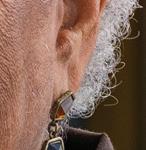



















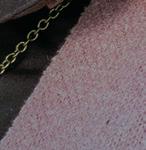









































short film that tells the story of the Scientific and Cultural Facilities District, which supports arts across the metro area. The film features local creative artists, highlighting the power of art to inspire and enrich lives.
IF YOU GO: Nov. 15, 6 p.m. Aurora Fox Arts Center, 9900 E. Colfax Ave. Admission is free. Details at aurorafoxartscenter.org
Jr.
The beloved animated movie comes to the stage in this junior musical adaptation. Join Alex the Lion, Marty the Zebra and their friends on a laugh-outloud journey for the whole family as they escape the zoo and find adventure. The performance is by a local youth theater group.
IF YOU GO: Nov. 14, 6 p.m.; Nov. 15, 1 p.m. and 6 p.m. The People’s Building, 9995 E. Colfax Ave. Ticket $24$29. Details at coloradotheatreguild. org.
The Colorado Jazz Repertory Orchestra (CJRO) hosts an intimate “Jazz Salon” featuring a conversation with acclaimed trumpeter Gabriel Mervine. Attendees can gain insight into his career and the world of jazz in this educational and cultural event.
IF YOU GO: Nov. 18, 11 a.m. Aurora Fox Arts Center, 9900 E. Colfax Ave. Tickets: $15-$20. Details at aurorafoxartscenter.org





















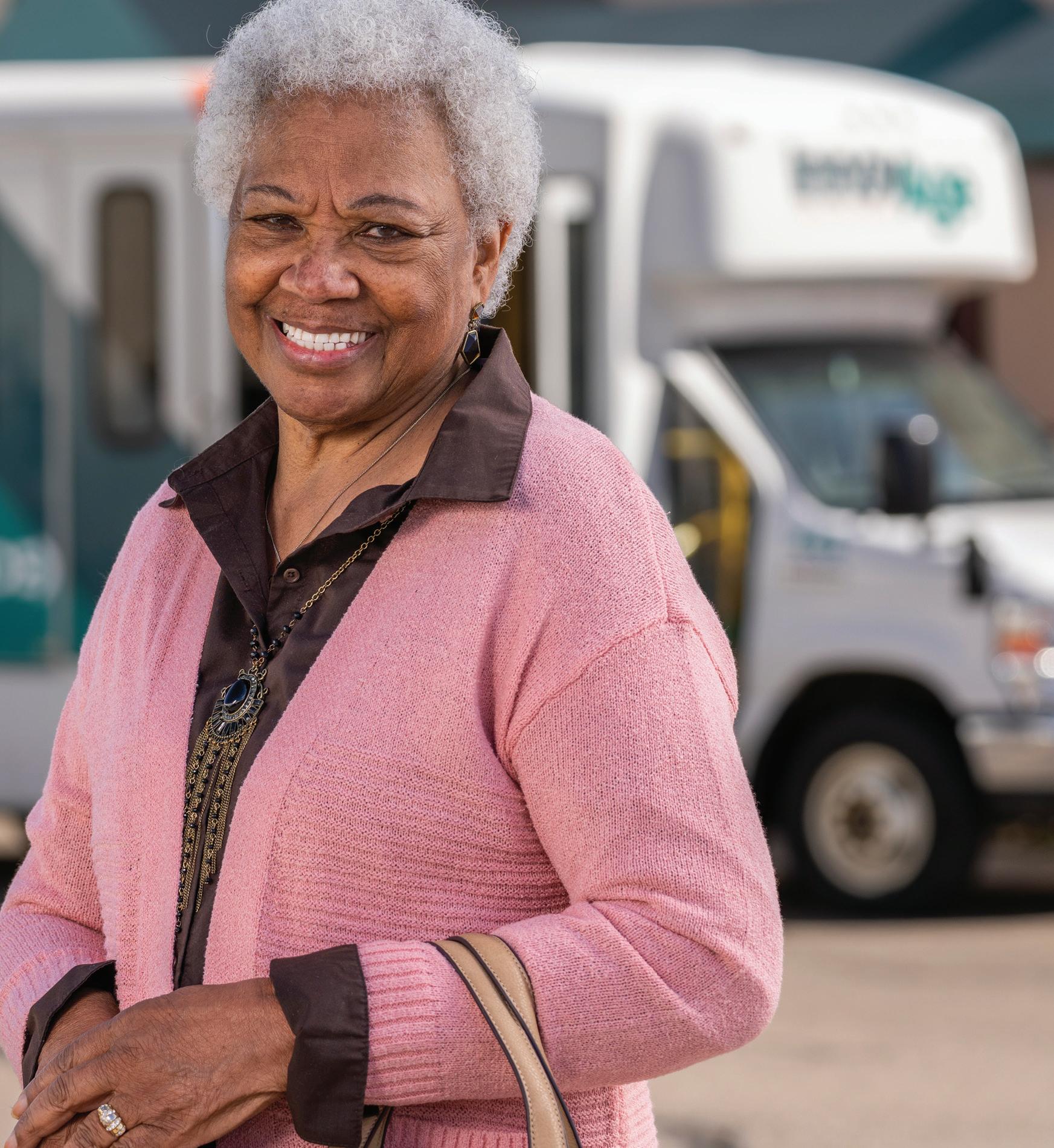

BY CASSANDRA BALLARD, Sentinel Staff Writer
Aurora’s newly elected “people-first” slate to city council are already discussing some areas where they might want to make changes and how they plan to work together, as their campaigns promised.
“We represent the whole of Aurora, not sections of Aurora,” Councilmember Ruben Medina, Ward II incumbent winner, said. “A community is everyone. It’s not exclusive to anybody. It’s inclusive of everyone, whether it’s their beliefs, gender, sexual orientation or political opinion, whatever may be. That’s what the makeup of our community is.”
While not official until the end of November, election returns consistently show Democratic and left-leaning candidates for Aurora City Council, Cherry Creek schools board and Aurora Public Schools winning in all of the contests for school board and city council seats.
Incumbent Councilmember Danielle Jurinsky conceded her at-large race Nov. 5.
“While last night’s election didn’t go the way we had hoped, I am deeply proud of the work we’ve accomplished together — the initiatives I led and the efforts I was privileged to support,” Jurinsky said in social media posts. “Four years ago, I was told I couldn’t win. But we did. And I have served my hometown and all of you with every ounce of passion, loyalty, and heart that I have.”
Elected were newcomers Rob Andrews, Ali Jackson, Gianina Horton, Amy Wiles and incumbent Medina.
Jurinsky, as well as Ward II incumbent Steve Sundberg, both Republicans, were not returned to office. What’s being considered a progressive sweep in Aurora was also seen nationwide. Whether it was Democratic liberals or progressives, many political majorities or gubernatorial and mayoral races were flipped in the 2025 elections. While many groups and individuals try to take responsibility for the flip, progressives and Democrats, being angry with President Donald Trump and his administration, are the most responsible for the change, according to Seth Masket, a political science professor at the University of Denver.
“It’s fairly common for the party that lost the election to do well the next year,” Masket said. “Because the losers of the presidential election tend to be angrier the following year at the president, and anger is generally a better motivator than satisfaction.”
The fact that the Aurora City Council election is considered nonpartisan did not stop voters from being aware of the candidates’ political leanings.
“My understanding of those particular elections in Aurora is that the candidates’ political leanings were fairly well known,” Masket said. “There were a number of fairly Trump-supportive Republicans there, and a lot of pretty progressive Democratic candidates.”
Jurinsky and Sundberg made frequent headlines in the Sentinel and media across the region, and even the nation.
Winners said they’re ready to turn away from the campaign and focus on the business of the new city council.
The decisive victory in all the races gives the left-leaning council block a 6-4 vote advantage over conservatives and Republicans still on the dais.
“I look forward to working with the newly elected Councilmembers,” Councilmember Curtis Gardner said to the Sentinel. “The best piece of advice I got when I was elected was to take six months to learn the job — meet with people, take tours, study the budget. I’ll continue to work to make Aurora the best City in Colorado to live, work and play and will support policies that further that goal.”
Some of the remaining city council members, including Gardner, Angela Lawson, Françoise Bergan
and Mayor Mike Coffman, have all seen the council majority flip over the years.
Between a virtual press conference held by the apparent winning candidates Nov. 7 and additional questions from the Sentinel, the soon-to-be council members shared their gratitude, spoke to what led to their win, and offered a few hints about what’s to come.
“Hope is much stronger than fear, than apathy, and though we have a long way to go to make sure that Aurorans are safe, and are truly thriving, it is only the beginning,” Horton, apparent winner in Ward I, said.
Apparent winners are two at-large contestants, Andrews and Jackson, Ward I candidate Horton, Ward II candidate Wiles and incumbent Councilmember Medina, who held on to his seat in Ward III.
All of the candidates posted convincing leads, which are apparent wins. The races are not officially called until Nov. 25.

“This election was not about being divisive,” Andrews said. “This election was about people coming together to end demonizing our city and our community. And what we want to do is we want to make sure that everybody loves our city. They have a place where they can work, love and play all day long.”
In highlighting both the mechanics and the meaning of this year’s results, Domonique James, the campaign manager for Medina, explained the conservative-to-progressive majority flip that will occur after the new members are sworn in on Dec. 1.
“What made this election, these election results, so exciting: People First candidates flipped the Aurora City Council,” James said.
James framed the victories as a case study in retail politics, overcoming financial disadvantages.
“Everybody had the same issues around money,” Medina said. “I’m proud that we all came together as a coalition.”
The progressive slate raised about $125,000 combined among four candidates, compared with more than $850,000 raised and spent by conservatives, James said. To close the gap, candidates and volunteers knocked on more than 35,000 doors and partnered with labor, climate, education, and civil rights groups.
“What we lacked in money, we made up for in our amazing volunteers, in our commitment to community and our willingness to go out and speak to people,” Wiles said.
Coalitions were also credited during the campaigns to host multiple political forums for people to engage with candidates, including the Aurora NAACP, Colorado Black Women for Political Action, Justice for Black Coloradans, Young Aspiring Americans for Social and Political Activism, known as the YAASPA and Alpha Kappa Alpha Sorority, Inc.
“It took collaboration, compassion and courage,” James said, with candidates who “represent the full diversity of Aurora,” which included electees from mid-career parents to early retirees, entrepreneurs, teachers and social workers.
Danielle Young-Kombo, a resident who helped with all of the candidates’ campaigns, said that hosting the high-turnout public forums, including at Arap-
ahoe Community College and Heather Gardens, greatly helped the candidates with engagement and name recognition. She said that the candidates who showed up to all of the forums were the ones who won.
Each candidate talked about where they hoped to focus their attention once sworn into office.
Horton said she is already prepared to hold a town hall in December to hear residents’ concerns. She said she wanted to focus on accountability in the Aurora Police consent decree and repeal mandatory minimum jail sentences as immediate policy targets.
The Consent Decree, imposed by Colorado Attorney General Phil Weiser in 2021, followed investigations into the Aurora Police Department’s excessive use of force and discriminatory practices, particularly against people of color. Triggered in part by the 2019 death of Elijah McClain, who died at the hands of police and rescuers after being stopped, unarmed, the decree mandates broad reforms in training, accountability, use-of-force policies, data systems and community engagement.
Wiles said she wanted to focus on infrastructure gaps in northeast Aurora, calling for grocery access, rec centers, and libraries, and she vowed to extend public speaking time at council meetings. She also supports bringing domestic-violence cases back to Aurora’s system to better serve victims.
Jackson said she wanted to thank labor and LGBTQ+ communities for their support. She also said she would be pressing for more public restrooms and citywide trash service, and pledged proactive engagement with immigrant residents. She told the Sentinel she also planned to do more work with the homeless population by helping people get off the streets and into shelters.
“I do believe in this Navigation Center, but let’s continue putting resources into just getting people off the streets so that we can not carry that persona and stigma,” Jackson said to the Sentinel. “It’s just dignity for everybody involved at that point.”
Andrews said he planned to prioritize progress with the police consent decree.
Medina touted what has worked for him in his pre-
vious years on city council, a ground game built on face-to-face problem-solving and said he’ll move to nominate Councilmember Alison Coombs as Mayor Pro Tem to diversify committee assignments. He said he also plans to strengthen meeting decorum rules, invest in youth mental health and explore economic-development projects that create union jobs.
Coombs said she spoke to Medina about his interest in nominating her to serve as mayor pro tem next year, and that she will submit a letter of intent.
Volunteer Kirk Manzanares spoke while standing in a spot he now dubs “Victory Row,” a celebratory line of campaign signs along Alameda and Sable.
“We did it,” Manzanares said. “I come from a family where I had four sisters and two brothers. Now I have many, many brothers and sisters. We work together as a community.”
Campaign staffers Jasmine Ross and Lindsey Rasmussen were credited for building a field-first operation that, as Ross put it, was “powered not by money, but by the passion and dedication of the people who believed in change for Aurora.”
As for the controversial bills approved by the majority of existing city council, some new council members said they would look into possibly moving domestic violence back to the Aurora Municipal Court from the county courts, reviewing mandatory jail sentences, and reinstating the business employee “head tax.”
Misdemeanor domestic violence cases were historically handled by Aurora’s municipal court until this last summer, when city council voted to have it moved to the counties, much like other cities already do. This was controversial because although it is rare for a municipal court to handle domestic violence, it was considered to provide better outcomes for victims and perpetrators.
Wiles said she would want to look into whether the cases are being handled well or being dropped, as was a fear among county officials. She said she would be interested in bringing them back to Aurora for the safety of the victims.
Horton suggested bringing back the Privilege Tax, or “head tax,” of $2 per employee per month paid
by employers in Aurora. She said she would want to speak with business owners to hear their perspectives. However, the $6 million in revenue the tax drew annually for the city could help address the current city deficit.
Aurora is one of the few places in Colorado that has mandatory jail sentences for petty crimes. The sentences include shoplifting and homelessness.
Horton, who has worked in the criminal justice industry, said that mandatory jail sentences are an injustice.
“It allows the system to abuse its authority on an individual who may or may not have the means to exit out of the system early,” Horton said. “Typically, it is also a strain of resources on a city, on a city’s budget, and at the same time, it incentivizes keeping people longer in the system than they need to be.”
Former progressive Councilmember Juan Marcano also said the new majority should move Aurora’s municipal elections to even-year cycles to lock in higher turnout. Head nods on screen suggested an appetite to study the shift.
James closed by inviting the public to the first entirely in-person council meeting in months on Nov. 17. The next meeting will be the final meeting with the outgoing council members before the new members take their elected seats.
“We made history with a record-breaking turnout, and this is proof that when you give people something to believe in, they will show up and they will vote,” Jackson said.
Current city council members frequently used a parliamentary procedure to end comments and debate initiated by Democrats on the dais. Debate and commentary would be cut short if any member of council called “ for the question. The measure’s purpose is to prevent filibusters. In the last year, multiple city council members, including Alison Coombs and Crystal Murillo, called out the Republican majority for using it to silence what they say is healthy debate and minority voices. This includes a more recent city council meeting Oct. 20, where it was used against Coombs to prevent her from making any comments before a vote on the agenda.
None of the candidates said they had specific changes they would make to the act of “calling for the question,” but each said they would be open to making changes if council members continued to use it repeatedly to silence debate.
“Call for the question” can be beneficial and should be used responsibly without being used as a tool to bully, intimidate or shut people down, At-Large candidate Alli Jackson said.
All the new council members agreed that there should be a healthy debate in which all voices are heard. Horton, who won Ward I, said she has noticed “call for the questions” has been used a lot this year to silence minority voices, and she would be open to making changes.
“I believe to establish a new sense of culture with new people coming into City Hall, to establish a new sense of respect across all council members, extending even to our public servants who work in the city, is to show that we can be a city council that can listen not only to the public but also to each other,” Horton said.
She said that as the new leadership transitions into their positions, they will need to evaluate the way members respond to each other and “make sure that’s rooted in respect, accountability and ultimately transparency for the public.
Andrews, who won an at-large council seat, said the progressive candidates all ran and succeeded by working together and that he would be interested in discussing changes after he had a chance to talk it over with the other city council members.
“Running this campaign was about doing things together and giving consensus and really bringing Aurora together,” Andrews said. “Nothing, from my point of view, nothing’s
going to happen in the vacuum or a silo.”
Ward II city council winner Wiles said that she watched as “call for the question was repeatedly used to silence anybody who disagreed with the majority,” and she said that it is not a way leaders should be running a city.
“We absolutely need to allow differing voices to express themselves and to get their entire thoughts out,” Wiles said. “We definitely need to look at what we can do to fix that so that it’s more equitable for everyone.”
Ruben Medina, the incumbent and winner in Ward III, said that it all comes back to decorum, and asking the public for decorum when there was a lack of decorum between city council members is an unfair ask.
“I am a firm believer that if we’re the leaders, then we have to lead by example, and so we can’t be bickering between ourselves, infighting, and then expect the public not to act the same,” Medina said.
He said he wanted to have some dialogue with the city attorney and to look at how he and other leaders put teeth into the requirement for council member decorum, such as a fine, censure, or another tool that could immediately stop that tactic from being used in that way.
“Is there something that we can do immediately that stops that, so that we can let people know, the public as well as each other, that there are certain boundaries and that we have to maintain a sense of respect for each other, regardless of the positions we hold,” Medina said.
The community is made up of different kinds of people, and only listening to the voices we want to hear and excluding the voices we don’t want to hear does a disservice to each other, ourselves and the greater community, Medina said.
Public expected to be reinvited to
“Public Invited to be Heard,” the listening session before the city council meetings begin, which allows members of the public to talk directly to city council members about any topic not on the current agenda, has undergone many changes in the last couple of years.
The public listening session is not required by state or charter mandate, and the city council majority may alter it in any way. Protests during city council meetings, especially those that have taken control of the public speaking session by not abiding by the time limits, prompted the city council majority to make changes to limit people from taking over. In the last year and a half, many of the protestors who seemed to have a power struggle with council members were a group of people demanding police discipline linked to Black men who were killed by Aurora police, while, in some cases, they were unarmed.
The family of Kilyn Lewis, a Black man who was unarmed and killed by Aurora SWAT after being pursued as a suspect in the shooting of someone in Denver, and their supporters all began protesting and calling for justice more than a year ago. Three more people have died, including two Black men, as the demand for justice and police reform continues.
Different moves made by the current city council to cut the speaking times and public viewing of the public speaking sessions were one of the main topics each of the new city council people ran on, each claiming that the public has a right to voice their opinions, even if the majority of city council disagrees with them.
“Whether it’s ‘public invited to be heard,’ or just more community voice altogether,” Jackson said, “meeting and hearing the needs of our community and figuring out just how we can connect our resources to them.
I’m always open to change.”
She said the “push and pull” between community and city council members — from cutting people off, cutting the time limit for speaking, and other tactics to silence the
community — is not “meeting community where they’re at.” She said that one example that sent a disgraceful message was that the Kilyn Lewis family was never apologized to.
“I think we can start to rebuild some of these broken connections with the community, and I think that’s going to help ease tensions,” Jackson said. “We can change things, so let’s be smart about it, and let’s work together.”
Andrews said he wanted to wait to speak with his fellow city council members before making any public decisions.
Medina and the other two Democrat city council members with whom he has been working with the last two years, council members Alison Coombs and Crystal Murillo, have all taken a stance against holding virtual city council meetings and restricting talk times as a way to prevent audience disruptions.
“The public needs to be present; we need to hear them,” Medina said. “I think they have a voice regardless of the issues or concerns, and we need to not take everything so personally, but take it for what it’s worth and have those dialogues.”
Back to his points involving the decorum with fellow city council members, he said that not hearing every voice in the community is a disservice to everyone.
Wiles based much of her campaign on the public’s invitation to be heard, and she wanted to extend the time people could speak. She said unlimited speaking time might cause additional problems, but there should be a place in the center that works for people.
“I think two minutes is really not long enough for somebody to be able to get their thoughts out effectively,” Wiles said. “I think we need to re-evaluate that decision and see if there’s maybe a happy medium.”
Newly elected council members, Andrews, Medina and Horton, all said they would want to work with the other city council members to make sure they are all on the same page before promising any specific changes, but they said they did plan to make some form of change to allow the community more of a voice.
Aurora’s Consent Decree and police reform
Since before the death of Kilyn Lewis, Aurora has garnered a reputation for police brutality and deaths of unarmed Black men at the hands of Aurora officers, the reputation prompted the Attorney General, Phill Weiser, to step in in 2021 and create a consent decree.
The Aurora Consent Decree followed investigations into the Aurora Police Department’s excessive use of force and discriminatory practices, particularly against people of color. Triggered in part by the 2019 death of Elijah McClain, who died at the hands of police and rescuers after being stopped, unarmed, the decree mandates broad reforms in training, accountability, use-of-force policies, data systems and community engagement.
Now, four years into the consent decree, many critics are unhappy with the pace and types of reforms and say it hasn’t improved the situation as promised.
The newly elected council members each had tentative suggestions they hoped to bring to the table.
Medina suggested beginning back-foot and bike patrols because they make officers more approachable and have shown much success in previous years’ trail runs. Police Chief Todd Chamberlain said during a previous Town Hall meeting that he did not think he had the manpower for foot patrols and that he has been sending drones up and down Colfax for added security. Medina said that although he appreciated where drones can help, they are not the same as having an officer be active in a community.
Jackson said she wanted to focus on Diversity, Equity and Inclusion programs in the city and ensuring that police receive proper training on bias and discrimination. She said she mostly just wanted to look into what is being offered and if it should be updated.
The Aurora Consent Decree could expire in the next year, and Andrews said he hopes to get it over with so the city can move on to a new genuinely independent monitor.
Along with the death of more Black men, such as Lewis, after the Consent Decree was implemented,
a group of activists and family members of Lewis began protesting at meetings and eventually disrupting city business. One of the prominent faces of the group demanding justice and substantial police reform in Aurora is MiDian Shofner.
Shofner began attending meetings to demand police discipline for Lewis’ death, along with his family members and others. Over time, the protestors grew more aggressive, disrupting other members of the public who came to speak or insulting specific council members, and the city council began responding to Shofner and others by making insults in return and imposing more restrictions on the public.
Eventually, it all became a power struggle between the two groups.
City council cut speaking times, stopped publishing public speaking sessions, and went completely virtual for months, until litigation with the Lewis family was resolved. During the Oct. 20 city council meeting, city council voted to bring the meetings and public listening back to in-person on Nov. 17. During the last virtual meeting Nov. 3, Shofner pledged to continue coming to meetings to protest the death of Rajon Belt-Stubblefield, who was killed by an Aurora officer Aug. 30.
“We continue to watch this council pretend like nothing has happened, no outrage by your body, only empty words for the family and praise for some of you to Todd Chamberlain,” Shofner said. “I find myself thinking that none of you have reached out to Phil Weiser or any other outlet for support on how the Consent Decree is still failing the community. You just arbitrarily listen to an entity you are paying $5 million to monitor the patterns of the police. At your next session, when you’re back in person, you will see us, and we will be there because your decision, your culture and your lack of leadership make disruption necessary.”
Shofner later told the Sentinel that having new council members means no change for her and that she will still attend all future meetings, holding them accountable in the same ways. In another video posted on Shoifner’s social media, she said, “We still have a lot of work to do,” after congratulating the new candidate’s win.
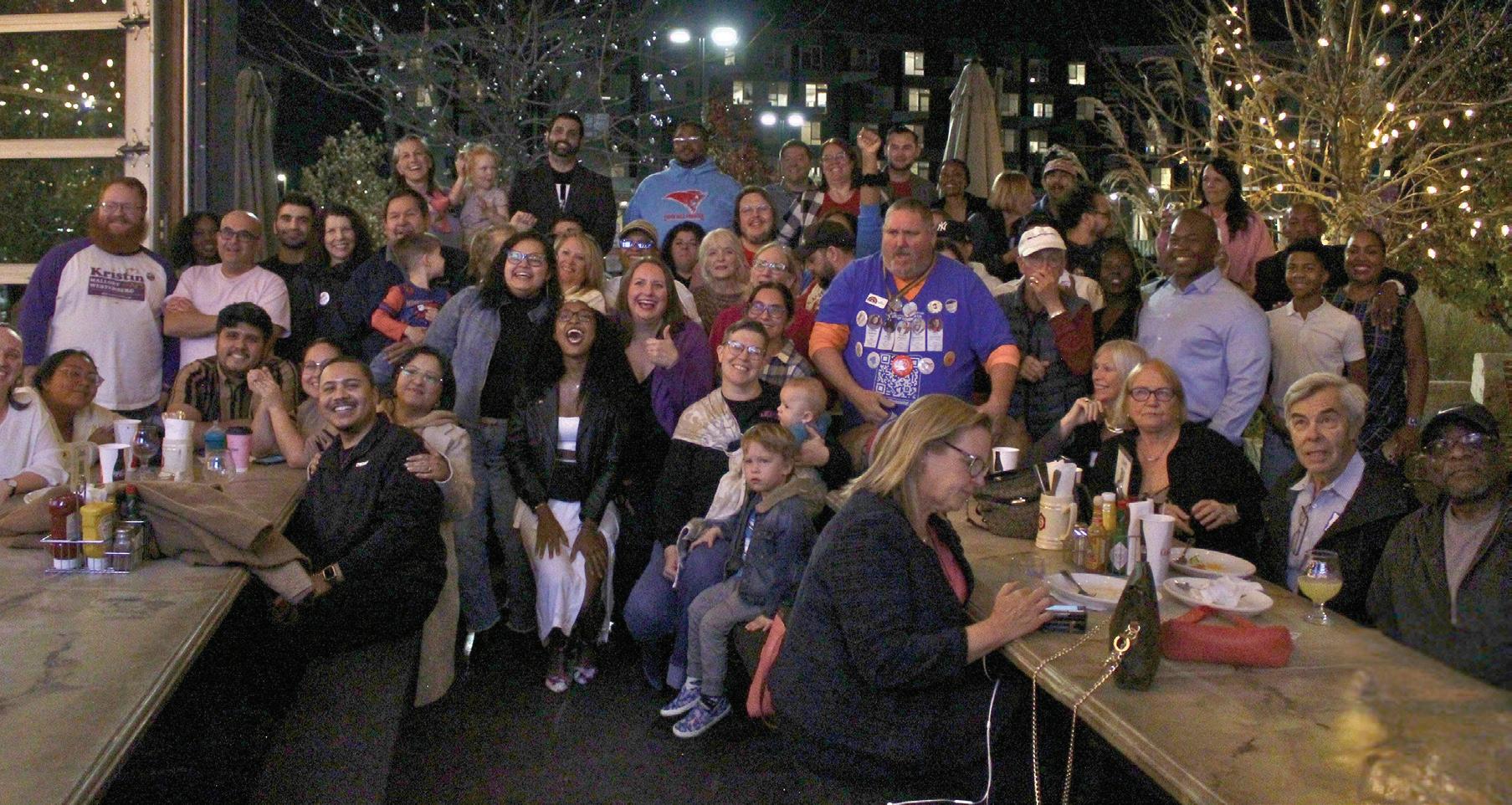
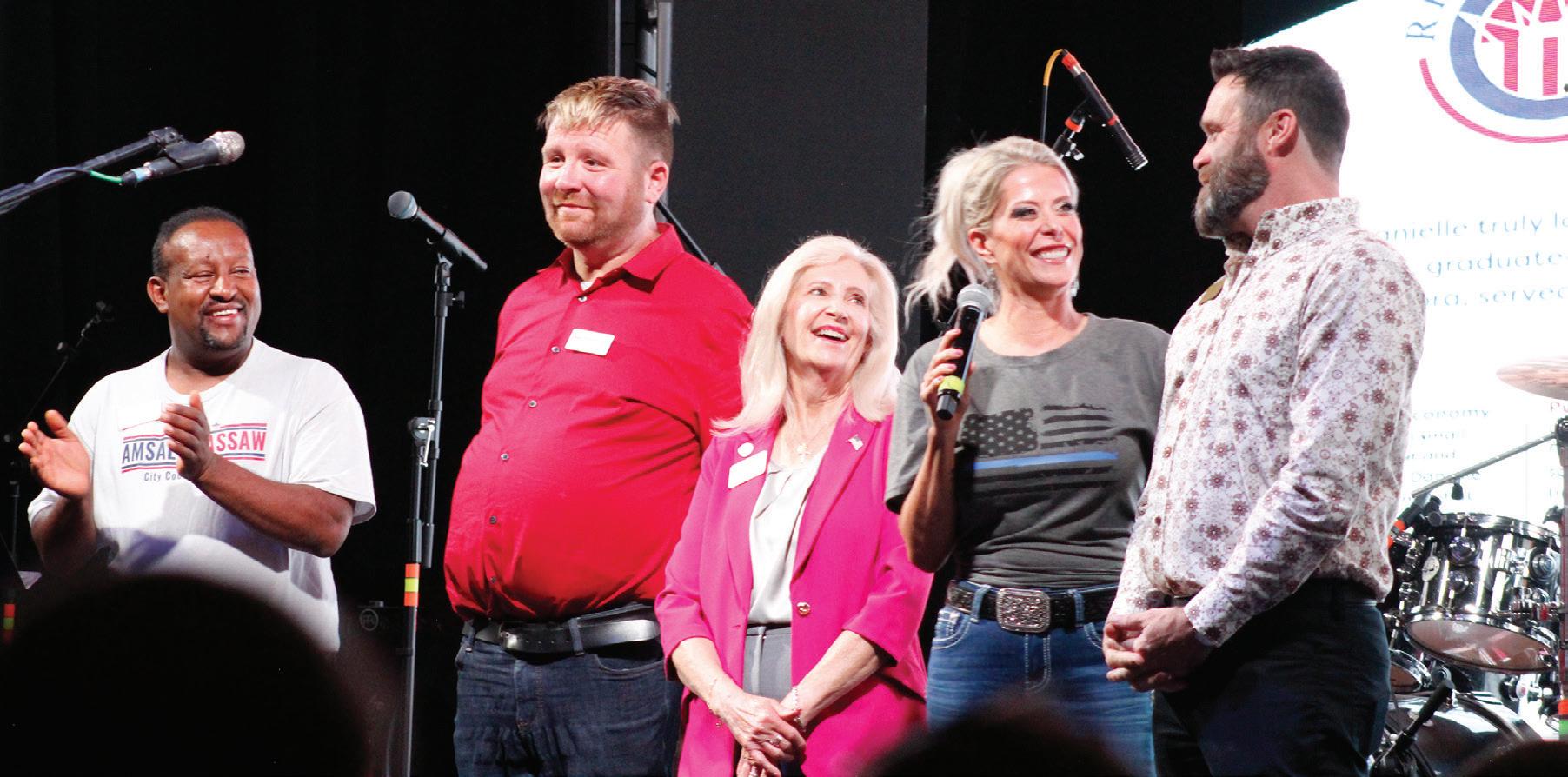
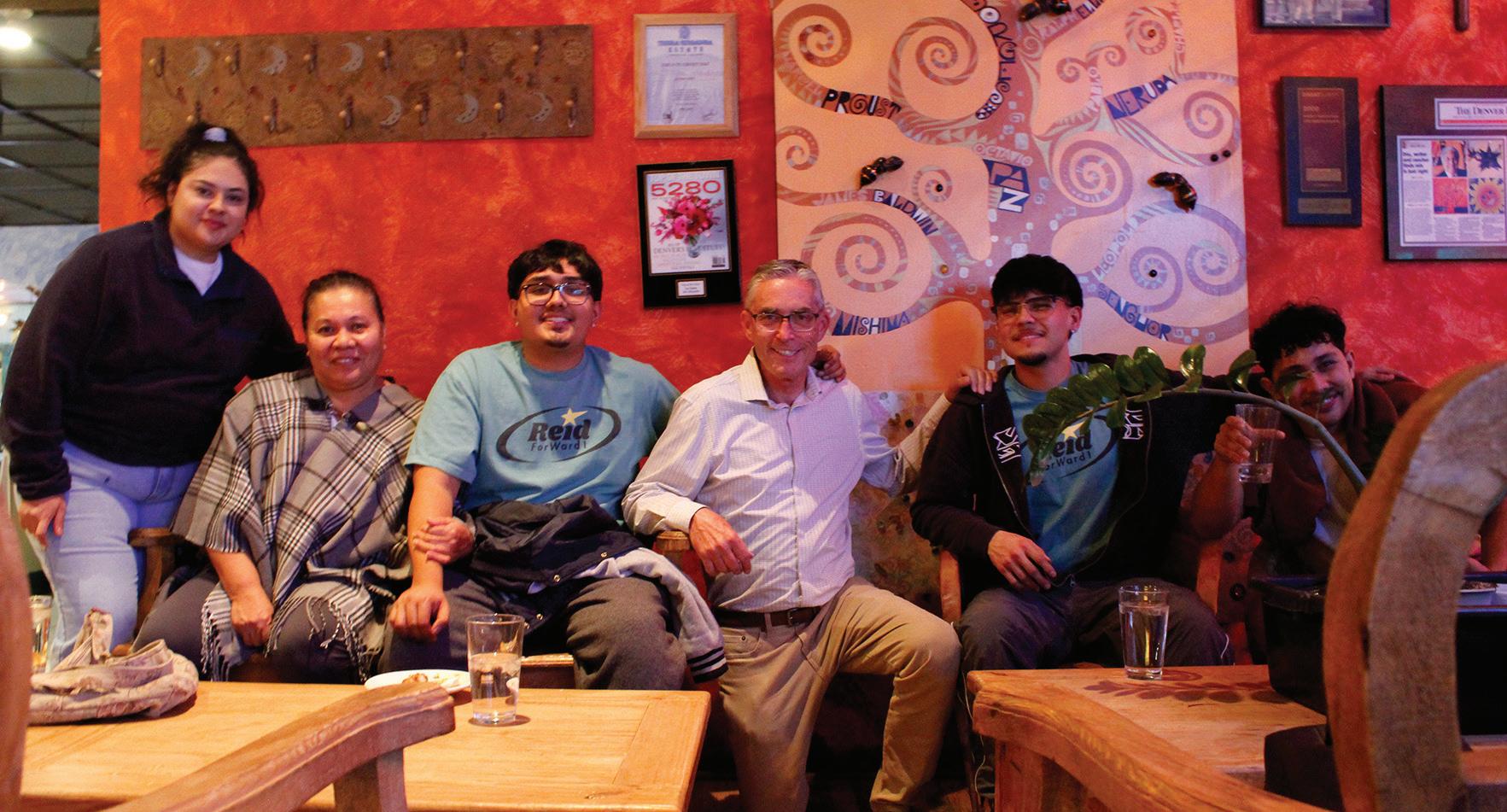
When the election season began, Shofner started a “vote them out” campaign against the Republican candidates up for reelection: Jurinsky, Steve Sundberg, and Amsalu Kassaw. Since then, Shofner stopped that campaign but quickly jumped to a “get out the vote” campaign in Aurora, encouraging people to vote and using different comedic stunts to get people involved in the election. Some candidates said they were never close to Shofner and do not owe her anything, while others said they would be respectful of her work and what she is fighting for, but that does not grant her access to demand anything the new council members cannot fulfil.
BOTTOM: The Rev. Reid Hettich, center, poses with city council campaign supporters Nov. 4. 2025 at an election night
restaurant in northwest Aurora.
back to boardroom
Voters in the Aurora Public Schools district chose four at-large board members from a pool of seven candidates this year.
Board members are elected at-large and represent the entire school district. Winning candidates are Gayla Charrier, Tramaine Duncan, Anne Keke and Kristin Mallory.
It is unclear what change Shofner expects to see with the new council or whether they will go along with any demands. Possible talks of negotiations have been mentioned, but nothing has been decided.
Charrier is a small business owner with a background in health care. She was a first-time candidate. Charrier’s campaign website says some of her priorities include ensuring students have equal access to education, partnering with parents and supporting teachers. She was endorsed by the Au-
rora Education Association, the local teacher union, Colorado People’s Action and the Denver Area Labor Federation.
Duncan is a middle school teacher with a background in education and mentoring youth. He is seeking a second term on the school board.
On a Facebook page for Duncan’s campaign, Duncan describes some of his goals for a second term as continuing to improve district policies, supporting teachers and providing support for multilingual and immigrant students.
Duncan is endorsed by the Aurora Education Association, Colorado Black Women for Political Ac-
There is little time for a new Aurora City Council to reflect on how liberal and progressive candidates swept last week’s municipal election. The needs are urgent and compelling.
On Nov. 4, Aurora voters decisively removed far-right Republicans Danielle Jurinsky and Steve Sundberg from their council seats.
Republican Amsalu Kasaw was hand-picked last year by key Republicans on the city council to replace former GOP strategist Dustin Zvonek, who resigned his seat. Amsalu faithfully supported the Republican agenda at every turn and vote, and he was also removed by Aurora voters.
The election now gives progressives six votes on the 10-member council, and potentially the votes of some of the more moderate city lawmakers remaining on the dais.
What it means is that the new city council can reverse or modify far-right policies that are seriously destructive to the community. These are policies and laws that don’t even come close to being representative of the vast majority of people who live here.
As veteran political strategist Floyd Ciruli pointed out this week in an essay, Aurora, as part of Arapahoe and Adams counties, has moved from voting about 40% “Democrat” in 2000 to about 60% last year. About two out of three voters in the Aurora region voted against Donald Trump in 2024, in what was a heavy voter turnout.
The now-gone city council members who backed the Trump agenda, and even drew Trump to Aurora last year, are not representative of the vast, culturally and racially diverse community that makes up the state’s third-largest city.
Numerous policies and legislation enacted by the past Republican city council, similarly, do not mirror the philosophies and attitudes of the majority of unaffiliated, moderate and left-leaning people who live here. Many of these changes made during the last four years ran counter to solid research, facts and data.
Changes that shut down the city’s critical and successful domestic violence court program were based on the factless political whims of partisan lawmakers legislating far-right ideology, not the needs of some of the city’s most vulnerable victims.
The next city council should immediately review the gaffe and determine whether the decision can be reversed without causing further strife for victims and the community.
Likewise, the current city council eliminated the city’s Diversity, Equity and Inclusion programs as part of a national obsession among far-right conservatives fearing such programs might erode opportunities for white people. In reality, one of the most important benefits of DEI programs in the workplace is simply helping everyone understand the needs and challenges of minority and non-minority city employees, stressing courtesy and civility, qualities noticeably lacking on the city council dais.
Similarly, Aurora businesses desperately need the city’s help in countering the false narrative perpetuated by President Trump, Jurinsky and others on the city council that the city is overwhelmed by Venezuelan gangs and rogue immigrants. Before this, Aurora has long been a community that not only supports its diversity and immigrant communities, but it boasted about them.
Aurora businesses need help pushing back against a generational wave of online ordering, destructive tariffs imposed by Trump and skyrocketing insurance and utility rates.
This year, after an astounding amount of personal council drama, city lawmakers foolishly curtailed a $2 per-employee-per-month head tax on businesses. The tax was created decades ago to help fund city roads and other infrastructure businesses depend on but local residents fund through real taxes. Seen mostly as a nuisance tax for almost all local businesses, it drew in $6 million a year. That was painfully cut out of city coffers, which now must result in service cuts or new taxes.
City lawmakers should immediately reinstate the reasonable levy and use the proceeds to support local businesses through marketing or public safety campaigns and projects.
While so many needs will vie for city council action almost immediately, the priority must be to address the critical problems plaguing the Aurora Police Department.
The state imposed a consent decree against the city and its police department in November 202. The decree determined after an extensive investigation that the department exhibited “patterns and practices” of using excessive force, especially against people of color. The department has drawn international attention and scorn for hiding and accommodating what is clearly a small number of inept or malfeasant cops, tarnishing the entire 700-person department and creating real fear in the Aurora community.
While it appears the department has made real progress in providing for improved transparency and training in the department, the reform efforts demand much more than what the police department has so far delivered.
Part of the problem has been outgoing city council members who have pandered to some police factions, pushing back against the depth and speed of mandated police reforms.
For years, the Sentinel, area elected officials, Attorney General Phil Weiser, numerous community groups and some city lawmakers have insisted that a truly independent oversight structure be implemented into the Aurora police system. The new city council should waste no time in researching these oversight groups in police departments across the country. City lawmakers should determine what oversight structure best serves residents and implement the change as quickly as possible.
Finally, Aurora is a large city without an independent audit component, something that has served Denver residents and taxpayers handsomely for decades. For now, city lawmakers should appoint review teams to scrutinize past spending decisions, contracts and board accommodations to ensure they were ethically and legally created. The current city council has meddled in a number of boards and commissions that affect public housing and development companies, as well as pacts creating lucrative contracts with billboard sign projects, which, previously, have been non-starters in Aurora for decades. The list of projects and decisions during the past four years that demand scrutiny is long and foreboding. But an electorate that much more closely represents the community must work to create a government the vast majority of Aurora wants, not a government without merit imposed on it.


AARON FUTRELL,
The birds are singing, the bees are buzzing, and the last of the green grass is hanging on—but something else is different in Aurora. There’s a new scent in the air. Not the sharp smell of fall or the shine of a new car, but something rarer: the unmistakable scent of change. You can feel it in the way neighbors greet each other more warmly, and in the way strangers linger a second longer in conversation. Aurora woke up this week to something it hasn’t felt in a long time—a new day in our political life.
Full disclosure: I entered Democratic politics four years ago, quietly and behind the scenes, hoping to honor the legacy of my grandmother, former Aurora City Councilmember Edna Mosley, who served our city from 1991 to 2002. I stepped into this world with conviction, but early on, the candidates I supported lost tough races, and my endorsement record didn’t inspire confidence. Still, I stayed committed.
This election cycle, something changed. People began to hear my voice a little more clearly. That voice did not emerge because a particularly divisive former council member once labeled me “irrelevant.” I didn’t owe my voice to them then, and I don’t now.
I owe it to the team of candidates, organizers, and staff who believed in me—not as a political accessory, but as a community member and leader. They took me in as a community member with a dream for his city, and for the first time, I felt Auro-
ra politics had space for me. That feeling was surreal given the years of division and hostility that defined our local government.
But this election marks a turning point—one shaped by thousands of voters who chose unity over chaos, compassion over cruelty, and progress over polarization. Aurora didn’t just turn a page; we began a new chapter.
We now have leaders prepared to govern with light, empathy, and integrity. Leaders who understand that public safety doesn’t require sacrificing community trust. Leaders who know that a healthy economy must work for everyone—not just the wealthy few. Leaders who believe that a unified city is a safer, stronger, and more prosperous one. My hope is that Aurora reclaims its place as the number one city for families—a place where opportunities are shared, where businesses want to invest, and where every resident feels they belong.
There are no demons here — only demon slayers. Everyday people who refused to accept fear as a governing philosophy. Residents who know compassion is not weakness, but our greatest strength. Voters who believed Aurora could be better, and proved it.
Today is a new day. A new dawn. And Aurora is already better for it.
AaronFutrell isacommunityadvocate,political organizer,andlifelongAuroraresidentcommitted tobuildingamoreunitedandcompassionatecity.

NOTICE OF PUBLIC HEARING
ON THE PROPOSED 2026 BUDGETS AND NOTICE OF PUBLIC HEARING ON THE AMENDED 2025 BUDGETS
The Boards of Directors (collectively the “Boards”) of the EASTERN HILLS METROPOLITAN DISTRICT NOS. 9-11, 21 & 22 (collectively the “Districts”), will hold a public hearing via teleconference on NOVEMBER 21, 2025, at 1:30 p.m. to consider adoption of the Districts’ proposed 2026 budgets (the “Proposed Budgets”), and, if necessary, adoption of an amendment to the 2025 budgets (the “Amended Budgets”).
The public hearing can be joined using the following teleconference information: https://us06web.zoom.us/ j/83811867883?pwd=jQnsNMlbpVoqy3GMyaQatBFmwD3775.1
Meeting ID: 838 1186 7883; Passcode: 761084; Call in Number: 720-707-2699
The Proposed Budgets and Amended Budgets are available for inspection by the public at the offices of Simmons & Wheeler, 304 Inverness Way S #490, Englewood, CO 80112.
Any interested elector of the Districts may file any objections to the Proposed Budgets and Amended Budgets at any time prior to the final adoption of the Proposed Budgets or the Amended Budgets by the Boards.
The agenda for any meeting may be obtained at https://www.easternhillsmetrodistricts.com/ or by calling (303) 858-1800.
BY ORDER OF THE BOARDS OF DIREC-
TORS: EASTERN HILLS METROPOLITAN DIS-
TRICT NOS. 9-11, 21 & 22, quasi-municipal corporations and political subdivisions of the State of Colorado /s/ WBA, PC
Publication: November 13, 2025
Sentinel
NOTICE OF VACANCIES
TO WHOM IT MAY CONCERN, and partic-
ularly, to the electors of the Mile High Business Center Metropolitan District, City and County of Denver, Colorado (the “District”).
NOTICE IS GIVEN that three (3) vacancies have occurred on the board of Directors of the District (the “Board”). Three (3) directors may be appointed by the Board to serve until the next regular election of the District in May 2027.
Any eligible elector of the District may sub-
mit a letter of interest to the offices of the District’ s legal counsel, Mill Law pllc 1555 California Street, 505, Denver, CO 80202. Letters of interest meeting the requirement of § 32-1-808 C.R.S., must be returned within ten (10) days of the publication of this Notice, which date is November 23, 2025.
Mile High Business Center Metropolitan District
Publication: November 13, 2025
Sentinel
By: /s/ MILLER LAW pllc
Public Notice
NOTICE AS TO PROPOSED 2025 AMENDED BUDGETS AND THE 2026 BUDGETS
NOTICE IS HEREBY GIVEN that amend-
ed 2025 and proposed 2026 budgets have been submitted to Powhaton Road Metropolitan District No. 1, Powhaton Road Metropolitan District No. 2, Powhaton Road Metropolitan District No. 3, Powhaton Road Metropolitan District No. 4, Powhaton Road Metropolitan District No. 7. A copy of such proposed budgets has been filed at the offices of Pinnacle Consulting Group, Inc., 550 West Eisenhower Blvd., Loveland, Colorado 80537, where the same is open for public inspection.
The Board of Directors will consider the adoption of the proposed budgets of the Districts at a Regular Meeting of the Powhaton Road Metropolitan Districts Nos. 1-4 and 7 to be held via Zoom on Tuesday, December 2, 2025, at 4:30 pm. Any interested elector of the Powhaton Road Metropolitan District Nos. 1-4 and 7, may inspect the proposed budgets at the offices of Pinnacle Consulting Group, Inc., 550 West Eisenhower Blvd., Loveland, CO 80537, and file or register any objections at any time prior to the final adoption of the budgets.
BY ORDER OF THE BOARD OF DIRECTORS: POWHATON ROAD METROPOLITAN
DISTRICT NO. 1 POWHATON ROAD METROPOLITAN DISTRICT NO. 2
POWHATON ROAD METROPOLITAN
DISTRICT NO. 7 By: /s/ Andrew Kunkel, District Administrator
Publication: November 13, 2025 Sentinel
Public Notice NOTICE AS TO PROPOSED 2025 AMENDED BUDGETS AND THE 2026 BUDGETS
NOTICE IS HEREBY GIVEN that amended 2025 and proposed 2026 budgets have been submitted to Powhaton Community Authority. A copy of such proposed budgets has been filed at the offices of Pinnacle Consulting Group, Inc., 550 West Eisenhower Blvd., Loveland, Colorado 80537, where the same is open for public inspection. The Board of Directors will consider the adoption of the proposed budgets of the District at a Regular Meeting of the Powhaton Community Authority to be held via Zoom on Tuesday, December 2, 2025, at 4:30 pm. Any interested elector of the Powhaton Community Authority may inspect the proposed budgets at the offices of Pinnacle Consulting Group, Inc., 550 West Eisenhower Blvd., Loveland, CO 80537, and file or register any objections at any time prior to the final adoption of the budgets.
BY ORDER OF THE BOARD OF DIRECTORS: POWHATON COMMUNITY AUTHORITY
By: /s/ Andrew Kunkel, District Administrator
Publication: November 13, 2025
Sentinel
Public Notice of Contractor’s Final Settlement
Pursuant to 1973 C.R.S 38-26-107, notice is hereby given that on/or after the 11th day of December 2025, final settlement with Earth Services and Abatement, LLC, will be made by the Joint District No. 28J of the Counties of Adams and Arapahoe (Aurora Public Schools) for and on account of the General Construction Contract for Gateway HS and Dartmouth ES, Bid #339425, and that any person, co-partnership, association, company, or corporation who has an unpaid claim against any of the contractors for or on account of furnishing of labor, materials, team hire, sustenance, provisions, provender, or other supplies used or consumed by such contractors, or any of their subcontractor, in or about the performance of said work may file at any time up to and including said time of such final settlement on/or after, 11th day of December 2025, a verified statement of the amount due and unpaid on account of such claim with the Board of Education of said school district at the office of:
Support Services Aurora Public Schools 15701 E. 1st Avenue Aurora, CO 80011
Failure on the part of claimant to file such statements prior to such final settlement will relieve said school district from all and any liability for such claimant’s claim.
JOINT DISTRICT NO. 28J OF THE COUNTIES OF ADAMS AND ARAPAHOE STATE OF COLORADO
First Publication: November 13, 2025
Final Publication: November 20, 2025 Sentinel
Public Notice of Contractor’s Final Settlement
Pursuant to 1973 C.R.S 38-26-107, notice is hereby given that on/or after the 11th day of December 2025, final settlement with LEI Companies, Inc., will be made by the Joint District No. 28J of the Counties of Adams and Arapahoe (Aurora Public Schools) for and on account of the General Construction Contract for Aurora Central HS Fire Alarm, Bid #3382-25, and that any person, co-partnership, association, company, or corporation who has an unpaid claim against any of the contractors for or on account of furnishing of labor, materials, team hire, sustenance, provisions, provender, or other supplies used or consumed by such contractors, or any of their subcontractor, in or about the performance of said work may file at any time up to and including said time of such final settlement on/or after, 11th day of December 2025, a verified statement of the amount due and unpaid on account of such claim with the Board of Education of said school district at the office of:
Support Services Aurora Public Schools 15701 E. 1st Avenue Aurora, CO 80011
Failure on the part of claimant to file such statements prior to such final settlement will relieve said school district from all and any liability for such claimant’s claim.
JOINT DISTRICT NO. 28J OF THE COUNTIES OF ADAMS AND ARAPAHOE STATE OF COLORADO
First Publication: November 13, 2025
Final Publication: November 20, 2025
Sentinel
Public Notice of Contractor’s Final Settlement
Pursuant to 1973 C.R.S 38-26-107, notice is hereby given that on/or after the 11th day of December 2025, final settlement with LEI Companies, Inc., will be made by the Joint District No. 28J of the Counties of Adams and Arapahoe (Aurora Public Schools) for and on account of the General Construction Contract for Aurora Central HS Fire Alarm, Bid #3382-25, and that any person, co-partnership, association, company, or corporation who has an unpaid claim against any of the contractors for or on account of furnishing of labor, materials, team hire, sustenance, provisions, provender, or other supplies used or consumed by such contractors, or any of their subcontractor, in or about the performance of said work may file at any time up to and including said time of such final settlement on/or after, 11th day of December 2025, a verified statement of the amount due and unpaid on account of such claim with the Board of Education of said school district at the office of:
Support Services Aurora Public Schools 15701 E. 1st Avenue Aurora, CO 80011
Failure on the part of claimant to file such statements prior to such final settlement will relieve said school district from all and any liability for such claimant’s claim.
JOINT DISTRICT NO. 28J OF THE COUNTIES OF ADAMS AND ARAPAHOE STATE OF COLORADO
First Publication: November 13, 2025
Final Publication: November 20, 2025
Sentinel
REQUEST FOR QUALIFICATIONS/ PROPOSALS
PLEASE TAKE NOTICE THAT Aerotropolis Area Coordinating Metropolitan District, a quasi-municipal corporation and political subdivision of the State of Colorado, is soliciting qualifications and proposals from qualified contractors to be selected as the 38th Avenue (Tibet to E470) Contractor for the Aurora Highlands Project in Aurora, CO.
A full copy of this Request for Qualifications/Proposals will be made available to interested bidders by contacting Tim Kemp using the email address below. It is intended that this Request for Qualifications/ Proposal will also be made available on BidNet.
Qualification/Proposal submittals must be electronically submitted via BidNet before 12:00 p.m. Mountain Time on Thursday, December 4, 2025. Qualifications/Proposals will not be accepted after the foregoing submission deadline, and hardcopies of Qualifications/Proposals will not be accepted.
A public opening will be held at 3:00 p.m. Mountain Time on Thursday, December 4, 2025 via Microsoft Teams. A link to this event can be found in the Request for Qualifications/Proposals.
For further information contact: Tim Kemp Construction Administration Practice Lead, Colorado Timothy.Kemp@Wilsonco.com
Publication: November 13, 2025 Sentinel
NOTICE TO CREDITORS BY PUBLICATION
PURSUANT TO §15-12-801, C.R.S. Case No. 2025PR31038
Estate of Douglas Slack aka Douglas Merl Slack aka Douglas M. Slack, Deceased. All persons having claims against the above-named estate are re- quired to present them to the Per- sonal Representative or to the District Court of Arapahoe County, Colorado, on or before March 10, 2026, or the claims may be for- ever barred.
Jacob Merl Slack Personal Representative 963 S. Jamaica St. Aurora, CO 80012
Attorney for Personal Representative Cassandra Wojcik #60600
Diana J. Payne, #12831 Beck, Payne, Frank & Piper, P.C. 3025 S. Parker Road, Suite 200 Aurora, CO 80014
Phone: 303-750-1567
First Publication: November 6, 2025
Final Publication: November 20, 2025 Sentinel
NOTICE TO CREDITORS BY PUBLICATION
PURSUANT TO §15-12-801, C.R.S. Case No. 2025PR31027
Estate of Lewis Calvin Sawyer aka Lewis C. Sawyer aka Lewis Sawyer, Deceased. All persons having claims against the above-named estate are required to present them to the Personal Representative or to the District Court of Arapahoe County, Colorado, on or before March 6, 2026, or the claims may be forever barred.
Kay A. Sawyer
Personal Representative 14390 E. Marina Dr., Apt 209 Aurora, CO 80014
First Publication: November 6, 2025
Final Publication: November 20, 2025
Sentinel
NOTICE TO CREDITORS BY PUBLICATION
PURSUANT TO §15-12-801, C.R.S. Case No. 2025PR31035
Estate of Byron West Macdonald aka Byron W. Macdonald aka Byron Macdonald, Deceased.
All persons having claims against the above-named estate are required to present them to the Personal Representative or to the District Court of Arapahoe County, Colorado, on or before March 6, 2026, or the claims may be forever barred.
Philip G. McClard
Personal Representative 400 W. South Boulder Rd., Unit 52 Louisville, CO 80027
First Publication: November 6, 2025
Final Publication: November 20, 2025 Sentinel
NOTICE TO CREDITORS BY PUBLICATION
PURSUANT TO §15-12-801, C.R.S. Case No. 2025PR31055
Estate of Lisa Mae Wyant, Deceased.
All persons having claims against the above-named estate are required to present them to the Personal Representative or to the District Court of Arapahoe County, Colorado, on or before March 16, 2026, or the claims may be forever barred.
Linda Marlene Wyant c/o Opfer|Campbell|Beck, P.C.
19751 E. Mainstreet, Ste. 215 Parker, CO 80138
First Publication: November 6, 2025
Final Publication: November 20, 2025
Sentinel
NOTICE TO CREDITORS BY PUBLICATION
PURSUANT TO §15-12-801, C.R.S. Case No. 2025PR31056
Estate of Zulema Mary Cordova aka Zulema M. Cordova aka Zulema Cordova, Deceased.
All persons having claims against the above-named estate are required to present them to the Personal Representative or to the District Court of Arapahoe County, Colorado, on or before March 6, 2026, or the claims may be forever barred.
Sondra J. Touris
Personal Representative 7704 E. Hampden Cir. Denver, CO 80237
First Publication: November 6, 2025
Final Publication: November 20, 2025
Sentinel
NOTICE TO CREDITORS BY PUBLICATION
PURSUANT TO §15-12-801, C.R.S.
Case No. 2025PR31060
Estate of Shirley Mae Martinez aka Shirley M. Martinez aka Shirley Martinez, Deceased.
All persons having claims against the above-named estate are required to present them to the Personal Representative or to the District Court of Arapahoe County, Colorado, on or before March 6, 2026, or the claims may be forever barred.
Loretta Ramos c/o 3i Law, LLC
2000 S. Colorado Blvd., Tower 1, Suite 10000 Denver, CO 80222
First Publication: November 6, 2025
Final Publication: November 20, 2025 Sentinel
NOTICE TO CREDITORS BY PUBLICATION
PURSUANT TO §15-12-801, C.R.S. Case No. 2025PR31061
Estate of Lawrence August Medina aka Lawrence A. Medina aka Lawrence Medina, Deceased.
All persons having claims against the above-named estate are required to present them to the Personal Representative or to the District Court of Arapahoe County, Colorado, on or before March 6, 2026, or the claims may be forever barred. Lorraine Medina c/o 3i Law, LLC 2000 S. Colorado Blvd., Tower 1, Suite 10000 Denver, CO 80222
First Publication: November 6, 2025
Final Publication: November 20, 2025 Sentinel
NOTICE TO CREDITORS BY PUBLICATION
PURSUANT TO §15-12-801, C.R.S. Case No. 2025PR31244
Estate of Mahlon Garrett McDuff aka Mahlon G. McDuff aka Mahlon McDuff, Deceased.
All persons having claims against the above-named estate are required to present them to the Personal Representative or to the Denver Probate Court of the City and County of Denver, Colorado, on or before March 21, 2026, or the claims may be forever barred.
Carson McDuff 112 Florence Road Riverside, CT 06878
Attorney for Personal Representative
David A. Imbler
Atty Reg #: 52038
Spaeth & Doyle, LLP 501 S. Cherry St., Ste. 700 Glendale, CO 80246 Phone: 843-452-8946 First Publication: November 13, 2025
NOTICE TO CREDITORS BY PUBLICATION
PURSUANT TO §15-12-801, C.R.S. Case No. 2025PR432
Estate of Mildred Ione Culp, Deceased.
All persons having claims against the above-named estate are required to present them to the Personal Representative or to the District Court of Arapahoe County, Colorado, on or before March 2, 2026, or the claims may be forever barred. Trudy DeBell
Personal Representative 24617 E. Florida Ave. Aurora, CO 80018
First Publication: October 30, 2025
Final Publication: November 13, 2025
Sentinel
NOTICE TO CREDITORS BY PUBLICATION
PURSUANT TO §15-12-801, C.R.S. Case No. 2025PR561
Estate of Bruce Walter Bennion aka Bruce W. Bennion aka Bruce Bennion, Deceased. All persons having claims against the above-named estate are required to present them to the Personal Representative or to the District Court of Arapahoe County, Colorado, on or before February 27, 2026, or the claims may be forever barred. Chloe Bennion
Personal Representative 5564 E. Custer Place Denver, CO 80246
First Publication: October 30, 2025
Final Publication: November 13, 2025 Sentinel
NOTICE TO CREDITORS BY PUBLICATION
PURSUANT TO §15-12-801, C.R.S. Case No. 2025PR596
Estate of Timothy Allan Bush, Deceased.
All persons having claims against the above-named estate are required to present them to the Personal Representative or to the District Court of Arapahoe County, Colorado, on or before March 13, 2026, or the claims may be forever barred. Stephen V. Bush
Personal Representative 17662 E. Kepner Dr. Aurora, CO 80017
First Publication: November 13, 2025
Final Publication: November 27, 2025 Sentinel
NOTICE TO CREDITORS BY PUBLICATION
PURSUANT TO §15-12-801, C.R.S. Case Number: 2025PR580
Estate of Rophitah Al-Jerico Walters, Deceased.
All persons having claims against the above-named estate are required to present them to the personal representative or to the District Court of Arapahoe County, Colorado, on or before March 10, 2026, or the claims may be forever barred. Deborah H. Walters
Personal Representative 6334 Cleora Road, Apt D1 Salida, CO 81201
First Publication: November 6, 2025
Final Publication: November 20, 2025 Sentinel
NOTICE TO CREDITORS BY PUBLICATION
PURSUANT TO §15-12-801, C.R.S. Case No. 2025PR31069
Estate of GHEORGHE CORNELIU MARGINEANU aka GHEORGHE C. MARGINEANU aka GHEORGHE MARGINEANU aka GHEOGHE CORNELIU MARGINEANU aka GHEOGHE C. MARGINEANU aka GHEOGHE MARGINEANU, Deceased.
All persons having claims against the above-named estate are required to present them to the Personal Representative or to the District Court of Arapahoe County, Colorado, on or before March 2, 2026, or the claims may be forever barred. Anisoara Violeta Costache Personal Representative 95 S. Grandbay St. Aurora, CO 80018
Attorneys for Personal Representative Charles E. Rounds Atty Reg #: 37786 Kirch Rounds & Bowman, P.C. Marketplace Tower II 3025 S. Parker Rd., Ste. 820 Aurora, CO 80014 Phone: 303-671-7726 First Publication: October 30, 2025 Final Publication: November 13, 2025 Sentinel
NOTICE TO CREDITORS BY PUBLICATION
PURSUANT TO §15-12-801. C.R.S. Case No. 2025PR30947









tion, the Denver Area Labor Federation and U.S. Rep. Jason Crow.
Keke is an instructor of career readiness for Colorado Early Colleges and has a background in criminal justice, including working for the 18th District Attorney’s Office. Keke is the current school board president and is seeking a second term on the board.
Keke’s campaign website lists her priorities as partnering with teachers, creating a culture of equity and belonging, and promoting student safety and wellbeing.
Keke was endorsed by the Aurora Education Association, Colorado Black Women for Political Action, the Denver Area Labor Federation and U.S. Sen. Michael Bennet.
Mallory is the former chair of the Arapahoe County Democratic Party and has a background in government service and community organizing. She is a first-time candidate.
Some of the priorities listed on Mallory’s campaign website are supporting policies that reduce poverty, protecting all students regardless of immigration status and empowering teachers.
Mallory was endorsed by the Aurora Education Association, Colorado Black Women for Political Action, the Denver Area Labor Federation and the Colorado Working Families Party.
Four candidates were seeking two open district seats for the Cherry Creek Schools district board. All of the candidates, seeking two district seats, ran for open positions.
In District D, Terry Bates won handily over Amanda Thayer.
Bates is the Chief Financial Officer for RK Industries and has experience working in finance and accounting. Bates’ five children graduated from the school district and his wife served two terms on the school board.
According to his campaign website, Bates’ campaign priorities are financial stability, maintaining academic excellence and expanding career and technical education.
Bates was endorsed by the local teachers’ union, the Cherry Creek Education Association.
Thayer was endorsed by the Colorado GOP and far-right advocacy group Colorado Parent Advocacy Network (CPAN).
In District E, candidate Mike Hamrick bested Tatyana Sturm for that seat.
Cherry Creek held four candidate forums, but Thayer and Sturm did not participate in the last forum. A press release from Thayer and Sturm said they didn’t take part in the final forum because of “personal attacks” from the other candidates.
Hamrick is a retired Air Force veteran whose two children graduated from CCSD. Hamrick serves on the district’s Long Term Facility Planning Committee and his wife, Democratic state Rep. Eliza Hamrick, was a teacher in the district.
According to Hamrick’s campaign website, his priorities include expanding career and technical education, supporting teachers and improving mental health resources for students.
Hamrick was endorsed by the Cherry Creek Education Association.
Sturm was also endorsed by the Colorado GOP and the Colorado Parent Advocacy Network (CPAN).
Voters mixed on six referred Aurora ballot questions
Aurora voters decided five amendments to the Aurora City Charter, touted as ways to modernize outdated provisions, improve clarity and promote fairness. One ballot question is reserved for residents and businesses along part of the East Colfax corridor.

The proposed changes spanned a variety of topics, from gender-neutral language to council vacancies and term limits.
Question 3B: Gender-neutral language — PASSED
Approved by voters, the measure will update the city charter with gender-neutral language. Many places in the city charter have gender-specific terms that would be updated without altering the intent or meaning of any provision.
Question 3C: Council vacancy procedures — PASSED
This ordinance addresses how vacancies on city council are filled, depending on the timing of the vacancy. A council may appoint a qualified person to serve for up to two years, or call a special or regular election. This change will clarify when appointments versus elections are used and could likely influence political decisions about when members resign.
Question 3D: City manager residency — FAIL
Currently, the charter requires the city manager to reside within city limits. This amendment would have eliminated that requirement, giving the city council discretion to decide residency conditions at the time of appointment.
Question 3E: Holding multiple public offices — FAIL
This amendment would have removed a ban that prohibits elected city officials from holding another elected public office. If approved, it would have allowed city council members to serve in more than one part-time elected position.
Question 3F: Term limits for council members — PASS
The proposal clarifies term limits for ward and atlarge council members. Currently, the charter does not distinguish between the two, requiring a council member who has “termed out” after 12 years in a ward seat to take a break before they can run for an at-large seat. If approved by voters, ward and atlarge term limits would be considered separate.
Voters supported the creation of a new economic tool in a special election on Nov. 4 to revitalize a key segment of East Colfax Avenue, a project that will now move onto the next chapter, according to a city statement.
The vast majority of residents, business owners and property owners along East Colfax between Yosemite Street and Oswego streets who voted, threw their support behind the creation of a Downtown Development Authority, known as a DDA, that is intended to supercharge efforts, including to improve safety, housing affordability and business opportunities in the small walkable neighborhood, the statement said.
“The authority, known as a DDA, is a governmental entity separate from the city and defined by state statute,” the statement said. “The DDA will be led by a board appointed by the mayor and confirmed by a majority of the city council to oversee the implementation of DDA programs.”
The DDA will use tax-increment financing to fund work along the East Colfax corridor, with a focus on safety, infrastructure, small-business support, housing and economic development, as outlined in the Colfax Community Vision and Action Plan.
The tax increment financing will not create new taxes, but it will instead raise funding by reinvesting the growth in sales and property tax revenue as activity in the DDA area increases over time. So it will take the increased profit from sales and property taxes going forward and collect them into its own fund to revitalize the area.
The boundaries of the East Colfax DDA stretch from Yosemite Street on the western end, to East 16th Avenue to the north, to the Fitzsimons Urban Renewal Area to the east, and to East 14th Avenue to the south, the statement said.
Now that voters within those boundaries have supported this approach, the mayor and city council

will be for the authority’s board. Board members will include one city council member and between four and ten members. Those members must be residents, landowners or business lessees within the authority’s boundaries, according to the statement.
“Information will be provided later this year about the city’s application and appointment process for DDA board members,” the statement said.
Over the last year, a draft Colfax Community Vision and Action Plan was developed as a long-term roadmap for revitalizing East Colfax and the surrounding areas of Northwest Aurora, the statement said.
“Grounded in community input, this plan lays out a shared vision for the next 10 to 20 years and outlines practical steps to achieve it,” the statement said.

This draft plan also sets the stage for creating the Downtown Development Authority and a nonprofit Community Development Corporation (CDC), which was chosen by community members and city council last year to complement the DDA.
“Together, these organizations would help create public improvements, support local businesses, and protect the area’s character while promoting economic growth that benefits everyone,” the statement said.
The CDC has a larger boundary area than the DDA and can operate beyond the DDA’s boundaries.
It would focus on housing, economic development, advocacy and coordination around area-wide issues. It would be governed by a community-based board and funded through grants, philanthropy, a self-sustaining real estate strategy, and not through the DDA’s tax increment revenue.
The DDA would only start to accumulate “increment tax” revenue over the coming year.
For details about the process and to review the draft version of the Colfax Community Vision & Action plan, please visit engageaurora.org/colfaxplan.
